
The Maserati Levante is a turning point in Maserati’s history. The brand new model, which made its World Premiere at the 2016 Geneva Motor Show, enables the Trident to access the largest luxury segment in the world. The Levante significantly contributes to the creation of the most complete product line-up in Maserati’s history.
The name Levante was inspired by a warm, Mediterranean wind that can change from mild to gale force in an instant, mirroring the character of the first Maserati SUV.
The Maserati Levante is based on the evolution of the saloon platform, designed exclusively by Maserati. The chassis has been specifically developed to offer unique on-road drivability and competitive off-road capability, with day-to-day comfort and practicality. The premium Italian SUV was conceived around three main pillars: Design, Exclusivity and Performance. It represents the optimum blend of these three elements in the SUV world.
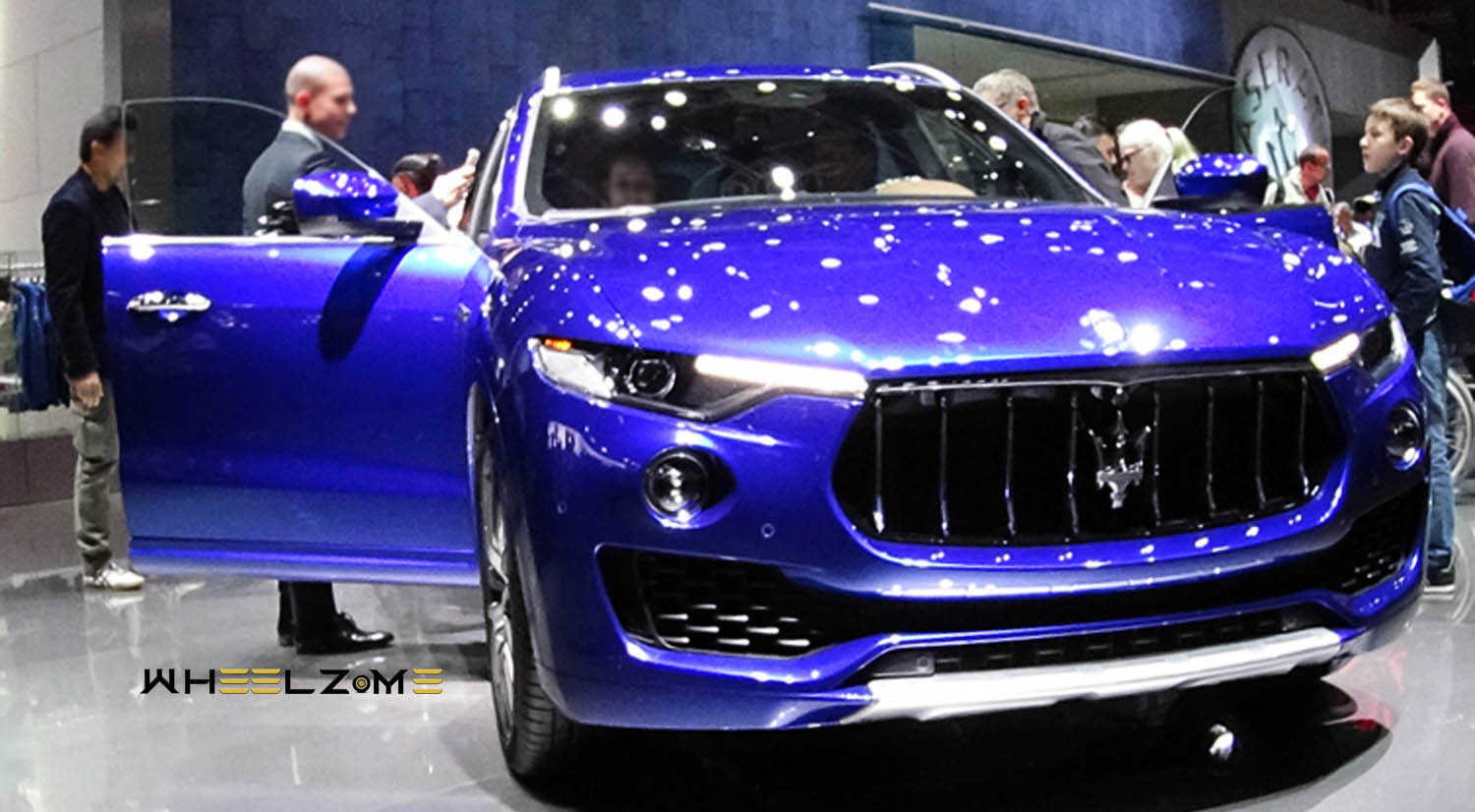
The Maserati Levante’s design is distinctive and attractive, embracing the aesthetic elements of Italian style. The design brings a new concept to the SUV world, combining spaciousness and coupé lines while achieving the best aerodynamic efficiency in its segment with a Cx coefficient of just 0.31.
Its exclusivity stems from technical features like Air Suspension and the Q4 AWD system, which come as standard equipment, and the high level of customisation that includes two cutting-edge packages, Sport and Luxury. The result is a driving experience that is as unique as the Maserati brand and its customers.
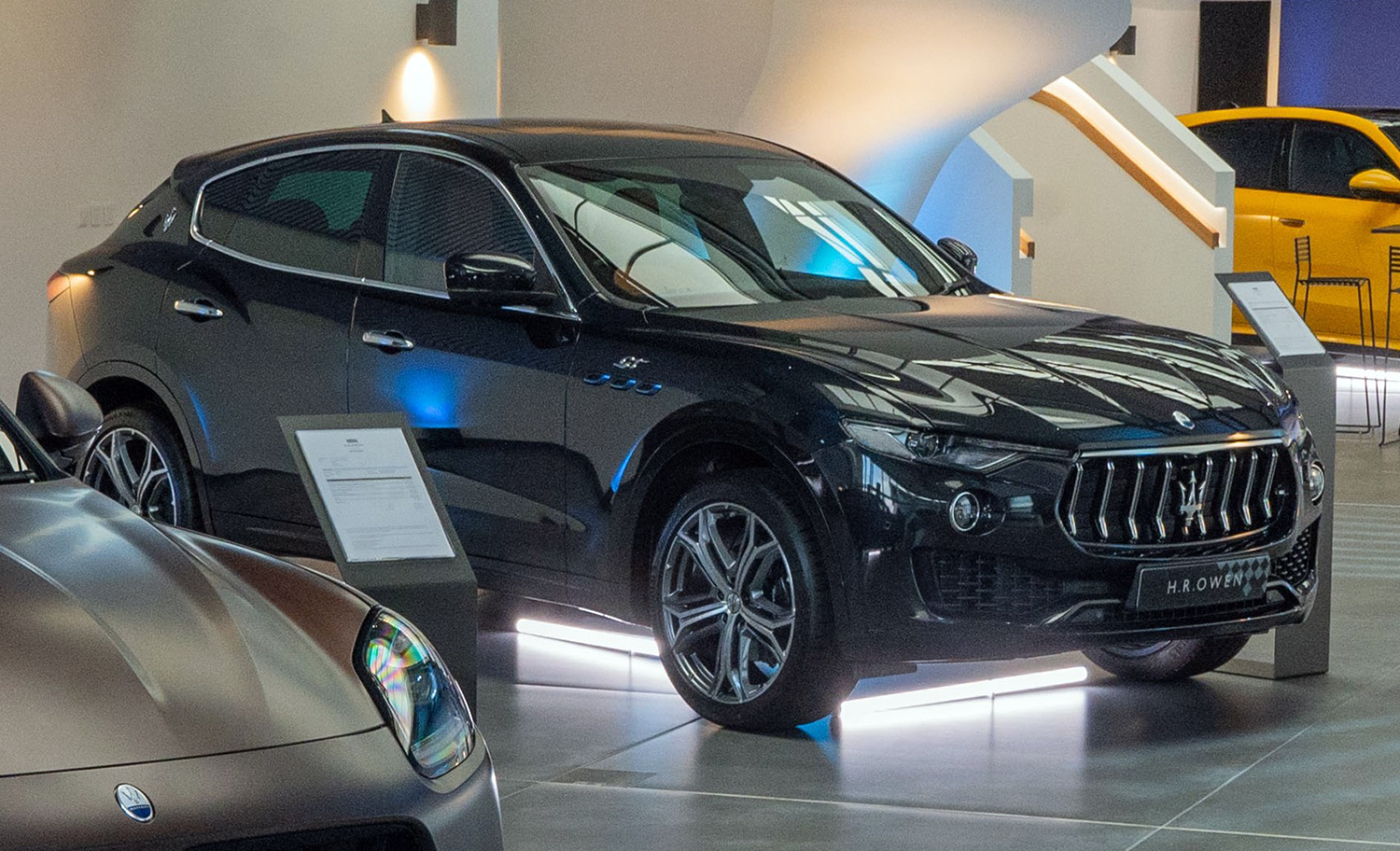
The thoroughbred on-road handling typical of all Maserati cars and the solid off-road capabilities, as demanded in the SUV segment, describe the car’s overall ethos. The Levante is here to excite any sports car driver counting on performance-oriented features, such as the extensive use of lightweight materials, ideal 50-50% weight distribution and its lowest in class centre of gravity. Features that deliver unparalleled agility in the luxury SUV class.
The aluminium “double wishbone – five link” suspension layout is comprised of standard Air Springs and electronically controlled Skyhook shock absorbers. In conjunction with the intelligent Q4 All-Wheel-Drive system and the newly introduced Torque Vectoring system which deliver GT on-road behaviour and surprising – for a Maserati – off-road capabilities: the Levante is designed to deliver best in class comfort on rough roads and handling on snow and ice.
The off-road equipment completes a product made to surprise avid travellers and adventure lovers as well.
Engine-wise, the Levante is equipped with the latest evolution of the Maserati 3-litre V6 engines. The two versions of the twin-turbo petrol engine and the economical turbodiesel are globally acclaimed for their unique Maserati signature sound and for their exceptional performance.
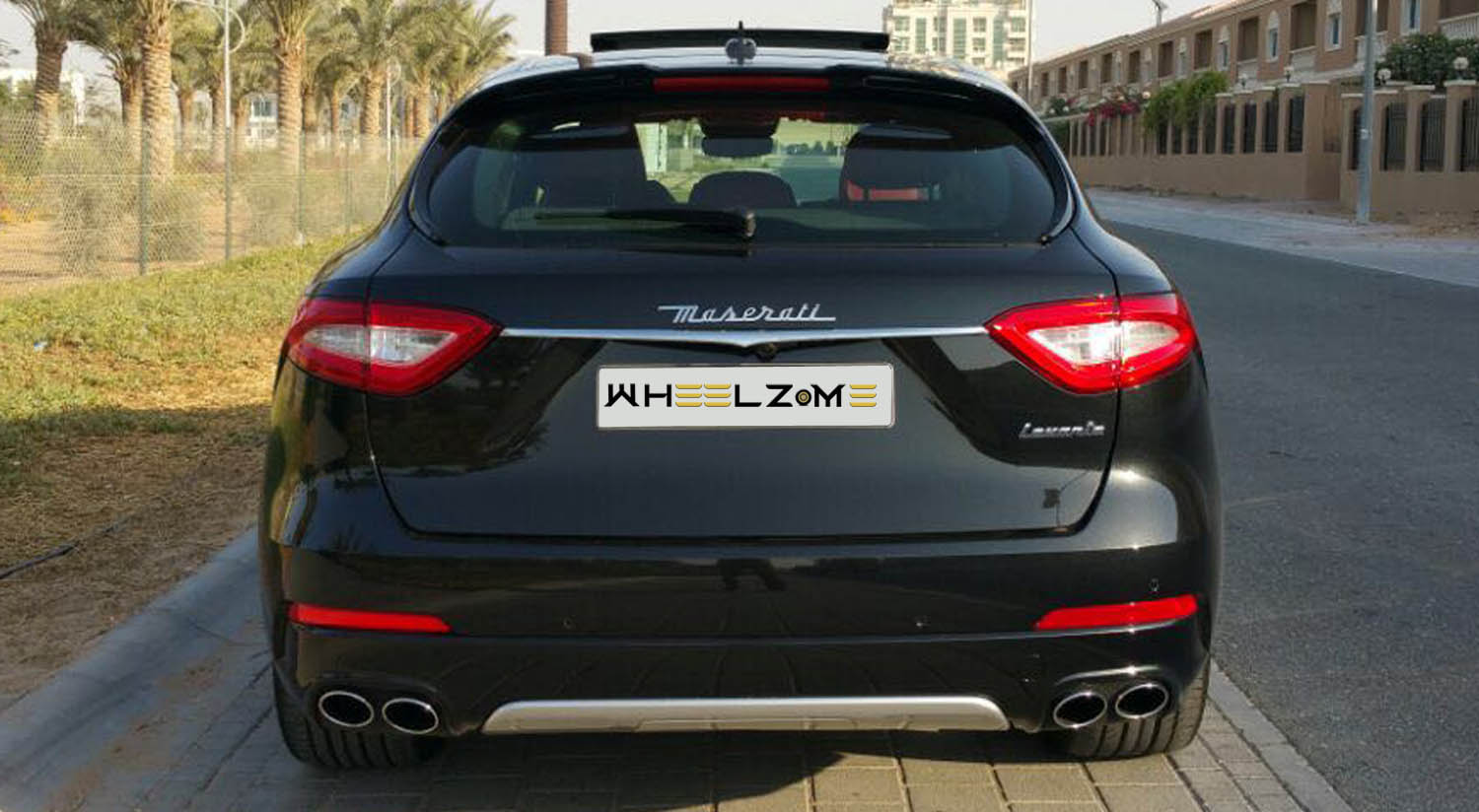
The petrol Maserati V6 engine with latest GDI and twin-turbo is available in two versions: the top of the range 430 hp and the exciting 350 hp. The most powerful Levante makes it to 100 km/h in 5.2″ and has a top speed of 264 km/h, while the figures for the 350 hp version are 6.0″ and 251 km/h respectively.
The Levante is also available with a common-rail, direct injection turbodiesel V6 with reduced dwell time injectors. The 3-litre engine is capable of 275 hp and delivers 0-100 km/h in 6.9 seconds and a 230 km/h maximum speed while keeping the fuel economy as low as 7.2 litres/100 km under the New European Driving Cycle (NEDC).
Both petrol and diesel versions of the Maserati Levante use the eight-speed automatic ZF gearbox that provides seamless comfort and fast gear shifting, depending on the selected drive mode. The Levante driver can choose between four drive modes, “Normal”
I.C.E., “Sport” and “Off-road”. Each one constitutes distinct characteristics intelligently altering engine, transmission, suspension and electronics features.
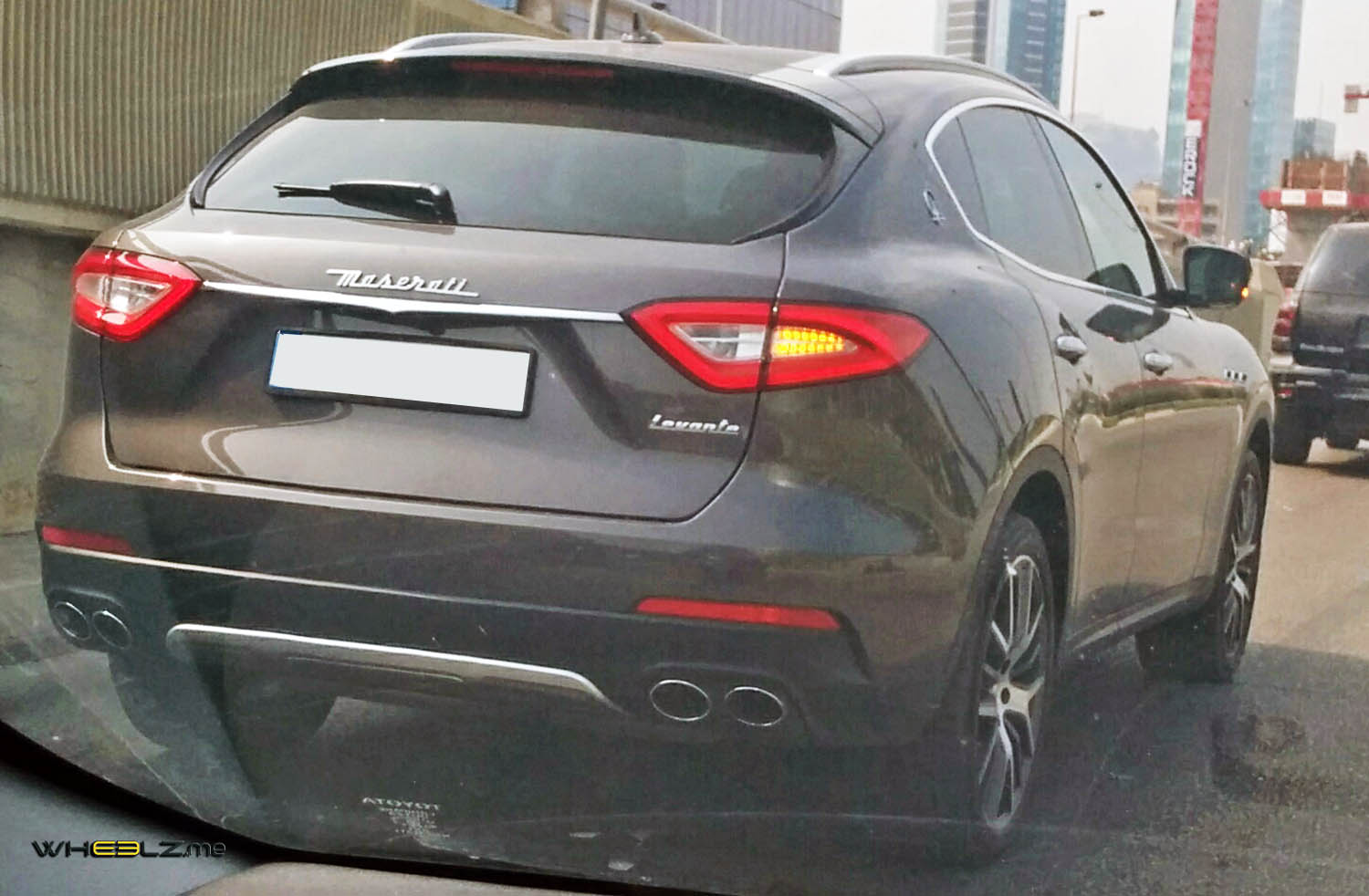
The Maserati Levante introduces several innovations to the current Maserati line-up; from safety to convenience options and through to the brand new Human Machine Interface and the dedicated cargo solutions. The range of equipment options is wider and more complete than ever.
The Maserati Levante has entered the SUV segment with a marked advantage in terms of new content. The innovative features of the car include: Adaptive Cruise Control with Stop & Go function, Forward Collision Warning and Brake Assist System, Lane Departure Warning, Surround View camera, capacitive 8.4″ Touch Screen display with brand new rotary control, plus the AHA function, an addition to the Maserati Touch Control Plus which extends the AM, FM and DAB digital radio with a network connection option: the AHA function dialogues with the user’s network-connected mobile device to give access to on-line services (radio stations, programmes, etc.) while on the move.
A new state-of-the-art production line was set up exclusively for the Levante in the historic Mirafiori plant, where high quality standards in every area, from design to development and from process controls to fabrication, are applied in full.
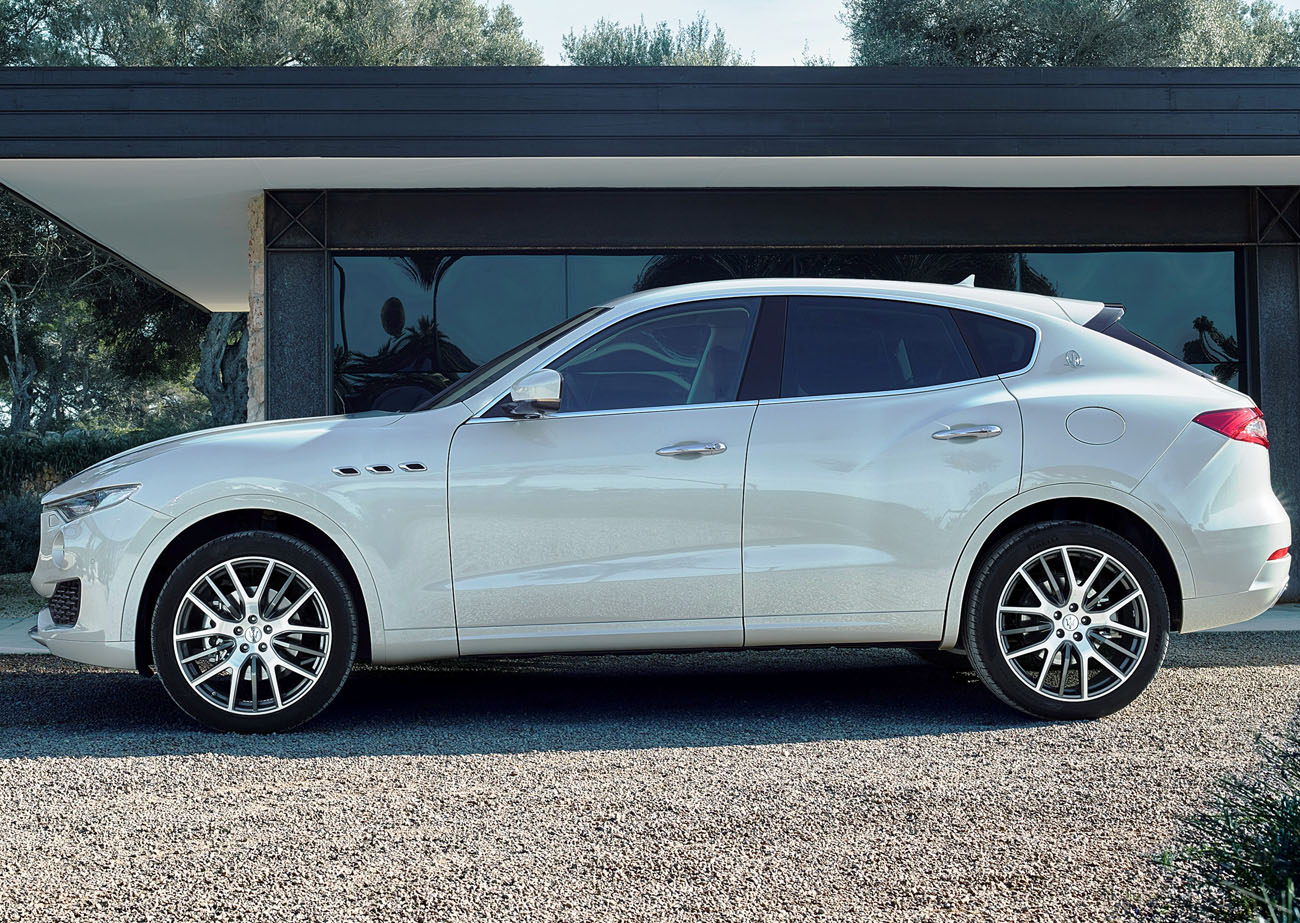
Maserati’s more than 100-year tradition of craftsmanship and cutting-edge technology guarantees outstanding quality right down to the tiniest of details.
Exterior Design
The Maserati DNA is clearly visible everywhere you look, ensuring that the Levante stands out among its competitors. The imposing grille is inspired by the sensational Alfieri concept and is destined to be a signature feature of all Maserati cars from now on.
The Maserati Levante is immediately recognisable as a Maserati, even from a distance. The muscular shape of the rear haunches gives it a distinctive and attractive Italian style.
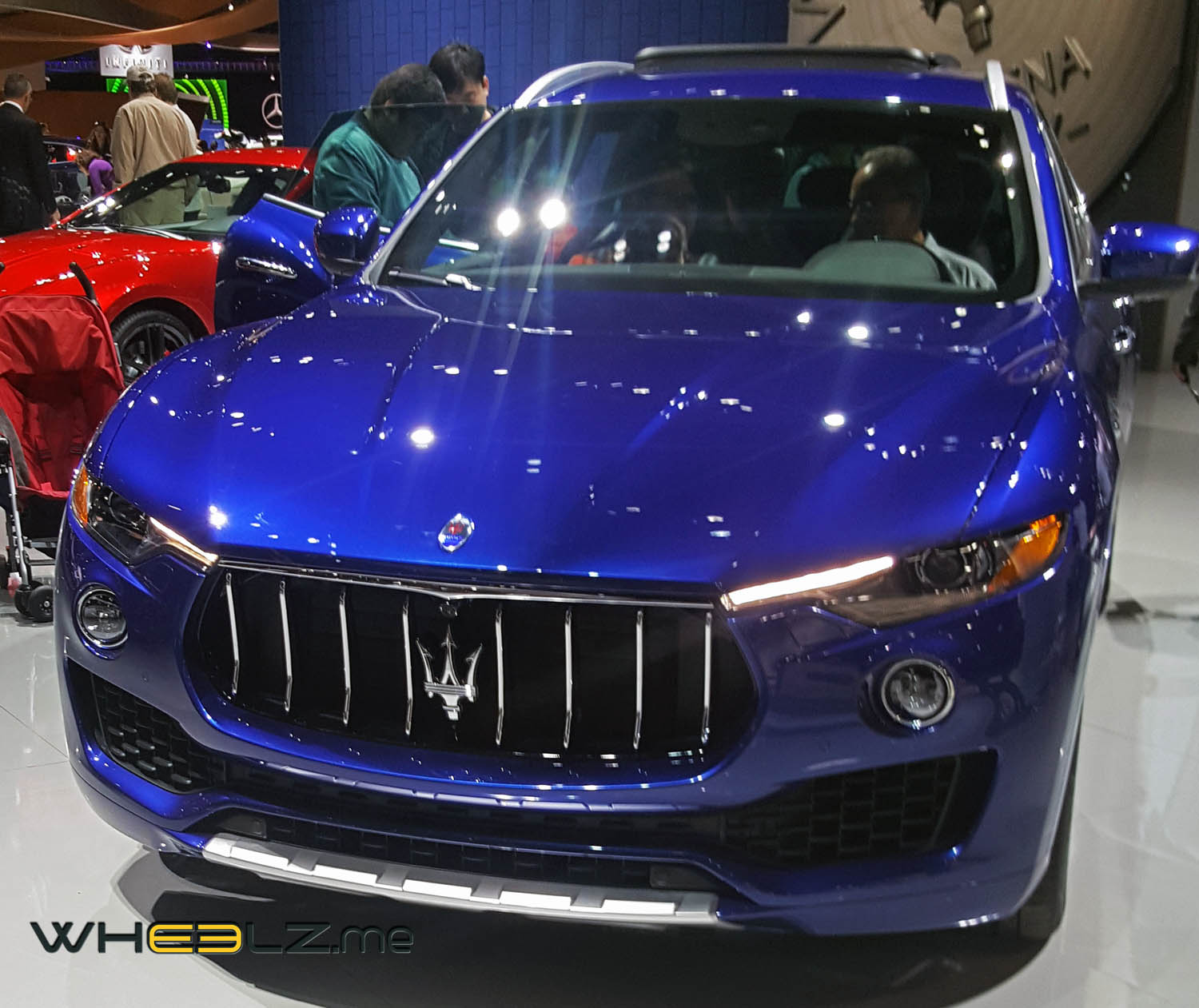
The signature concave grille pays homage to historical Maserati models like the Tipo 60 Birdcage. It is accentuated by the flow of the front wings, which emphasize the shape of the engine compartment lid and run into the headlight surrounds at the front. The particularly effective headlights featuring Bi-Xenon and LED technology then converge with the Trident symbol at the centre of the grille.
The silhouette of the Levante moves from its feline-inspired headlights along the side of the car to the characteristic Maserati rear pillar, resulting in a coupé look that is enhanced by the frameless doors, a feature of every modern Maserati.
The rear pillar is refined by the insertion of the characteristic “Saetta” logo, first seen on the iconic Quattroporte in 1963, and seamlessly follows the shape of the side windows.
The side profile is defined by a swaged line that runs the entire length of the car. It departs from the signature side vents at the front and fades over the rear wing, defining its muscular shape and emphasizing its underlying strength.
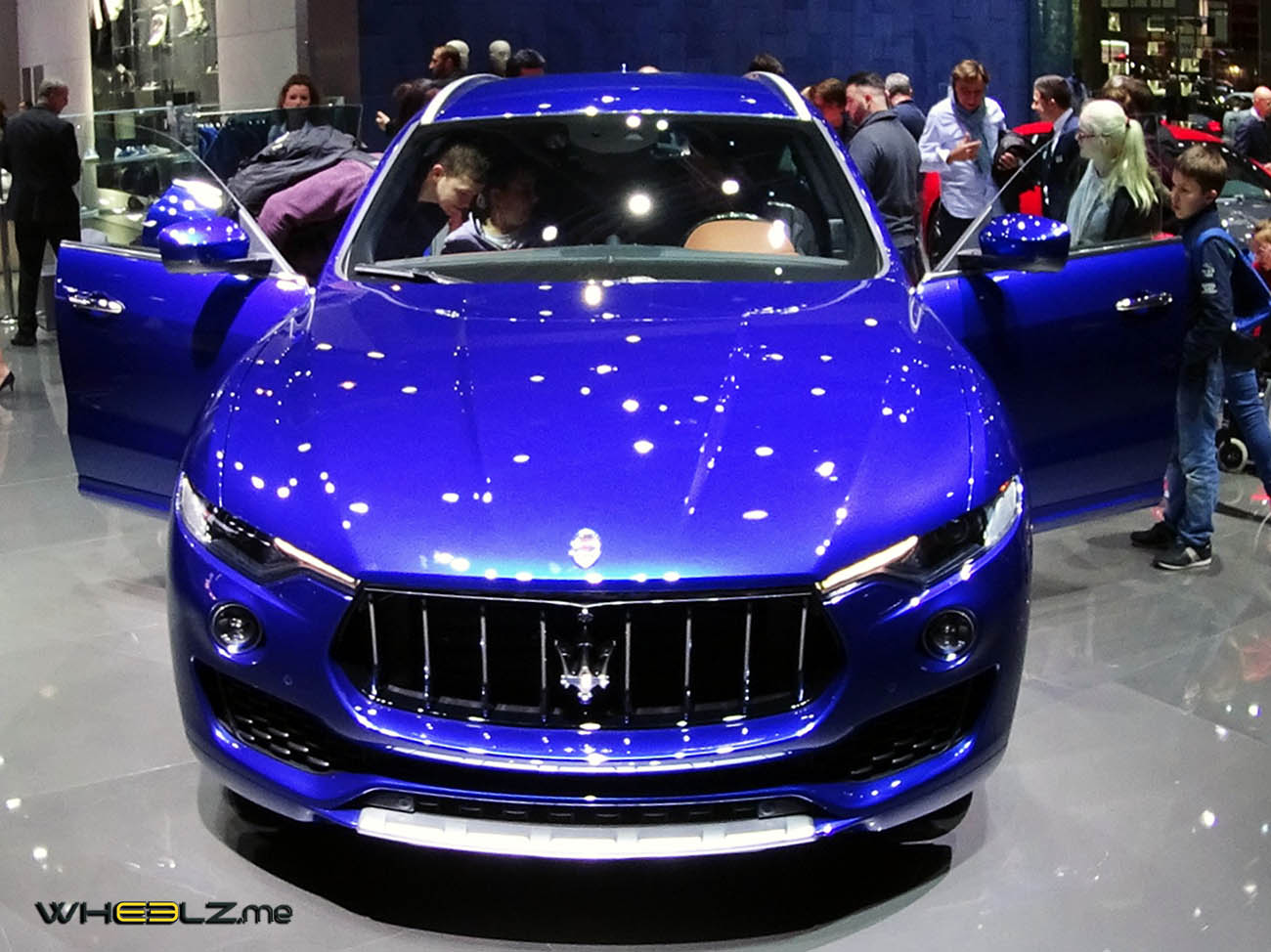
The profile view is completed by a wide choice of alloy wheels, lightweight and sporty and coherent with the Maserati design language, with the Trident design neatly integrated into the spokes.
The 5-metre long Levante is the longest car in its segment and its 3-metre wheelbase is 6-10 cm longer than that of its major competitors. As a result, the car is one of the roomiest in its class and also boasts the sportiest and most elegant design in the luxury SUV segment.
Best in class aerodynamics
The Maserati Levante has best in class aerodynamic efficiency thanks to a Cx coefficient of 0.31. This is the result of meticulous simulations in a virtual environment and extensive tests in the Turin wind tunnel. Maserati invested in advanced measuring methods for the aerodynamic tests on the Levante in order to simulate real life conditions in the best possible way.
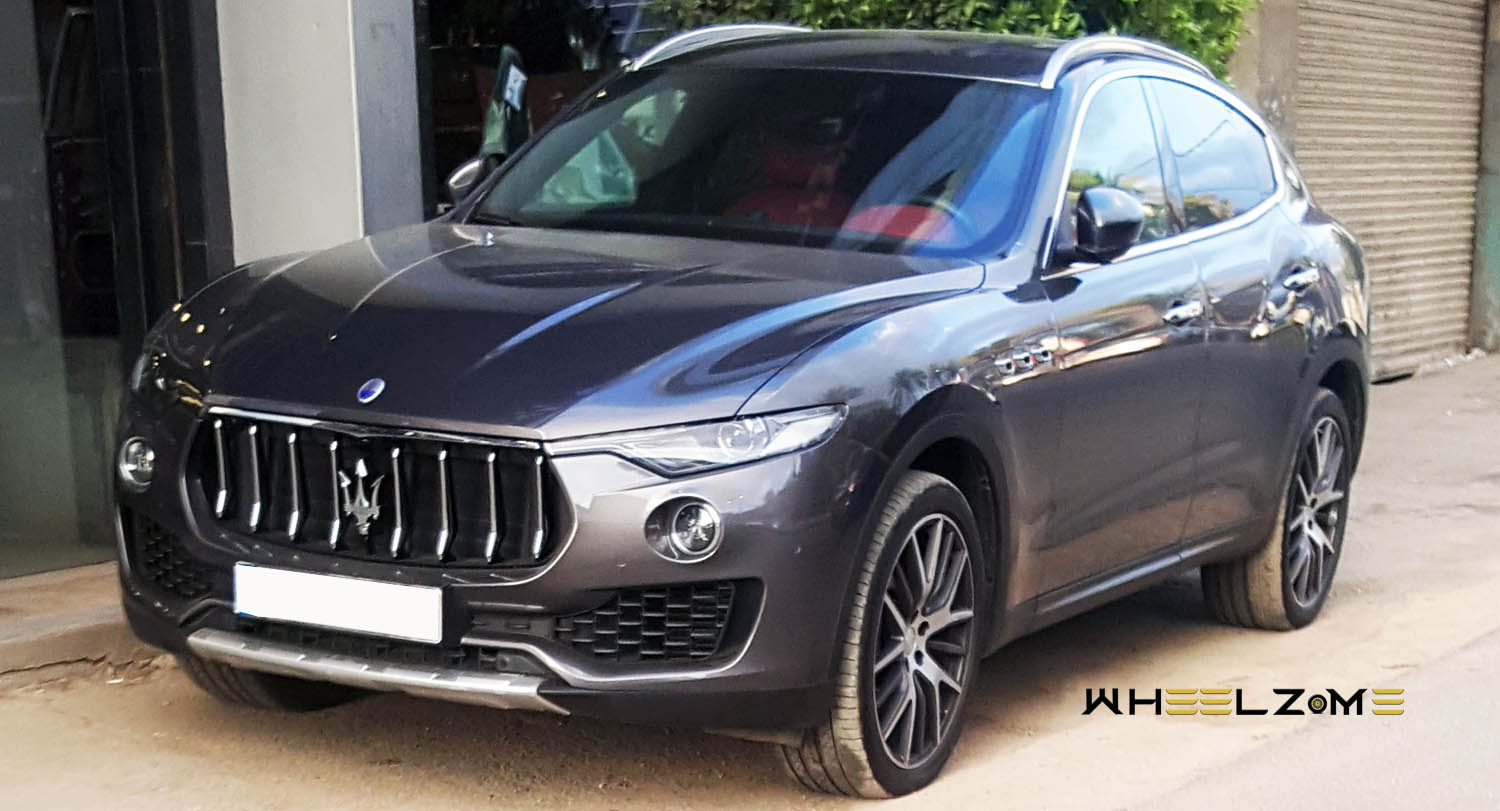
During the lengthy aerodynamic testing the Maserati engineers concentrated on optimising the air flow around and inside the car. They worked hard to maximise the air flow in the concave grille and in the area of the wheel arches.
In addition to the car’s technical sophistication and inspired design, the final result was also shaped by active aerodynamics in the form of an electric Air Shutter that was included in the front grille for the first time in a Maserati.
The Air Shutter is located between the front air vents and the engine’s radiator. Thanks to the continuous, electronically controlled movement of the blades, the shutter controls the air flow to the engine compartment with multiple benefits in both engine and aerodynamic efficiency.
The Air Shutter provides optimal control of the engine temperature, reduces the aerodynamic drag of the car and subsequently reduces fuel consumption and emissions.
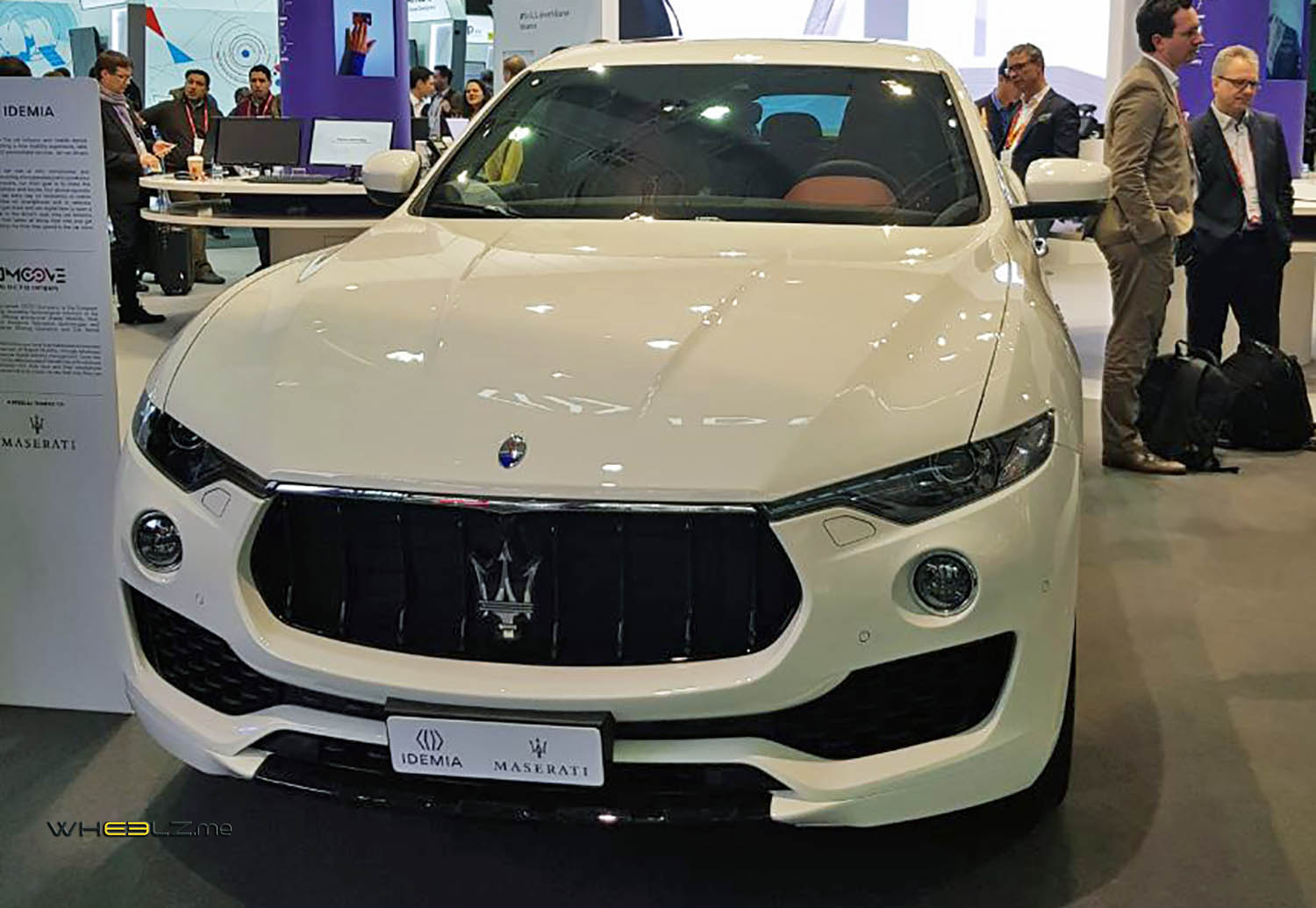
Intelligent Bi-Xenon & LED lights
The Maserati Levante’s front lights are elegantly styled and especially effective as they feature Bi-Xenon headlights with optional AFS and LED technology for the Daytime Running Lights, the indicators and the standard fog lights.
The LED DRL offer maximum visibility day and night and add to the sporty and elegant look of the car.
During daytime driving, when the low/high beam is off, the DRL’s are at maximum brightness and they dim automatically when the low/high beam is on or when an indicator is activated.
The LED tail lights are also highly innovative, providing excellent visibility but also emphasising the style and safety features that are essential in a car of this class.
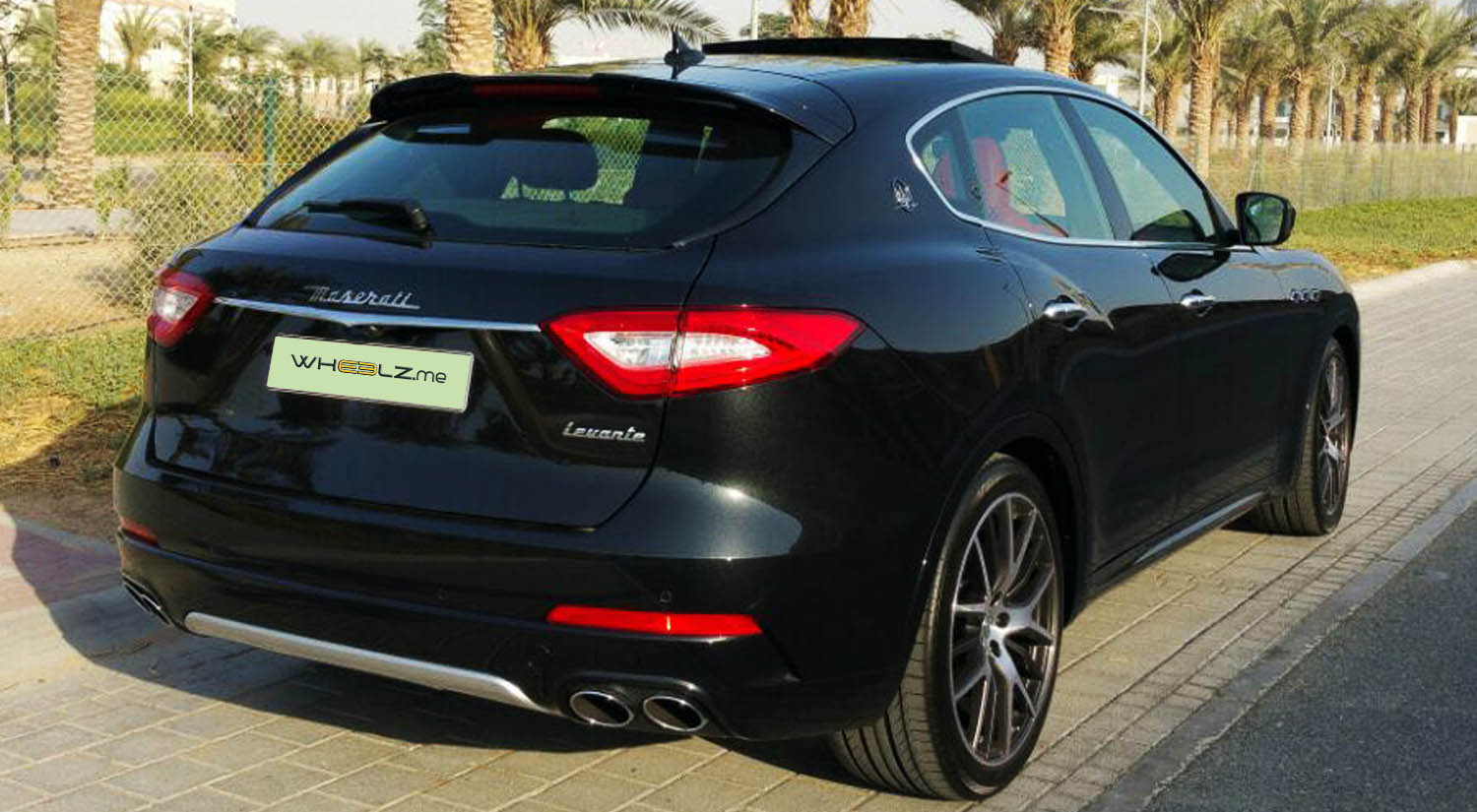
Adaptive Front-lighting System
The AFS (Adaptive Front-lighting System) can be integrated in the front lights as an optional extra. Thanks to the automatic adjustment of the headlamp beam, the AFS provides an outstanding view of the road in all driving conditions along with high levels of efficiency in terms of safety, without dazzling oncoming drivers. The AFS features different beam modes for driving on motorways, country roads, city roads and for adverse weather conditions.
When the optional AFS is fitted, thanks to a video camera mounted in the rear view mirror housing, a motorway driving beam control system automatically maximises the depth of the beam without any need for manual high-beam activation.
The uniform, intense beam, combined with automatic adjustment of the headlight depth and width, ensures an outstanding view of the road in all conditions. The system completely avoids blinding oncoming traffic.
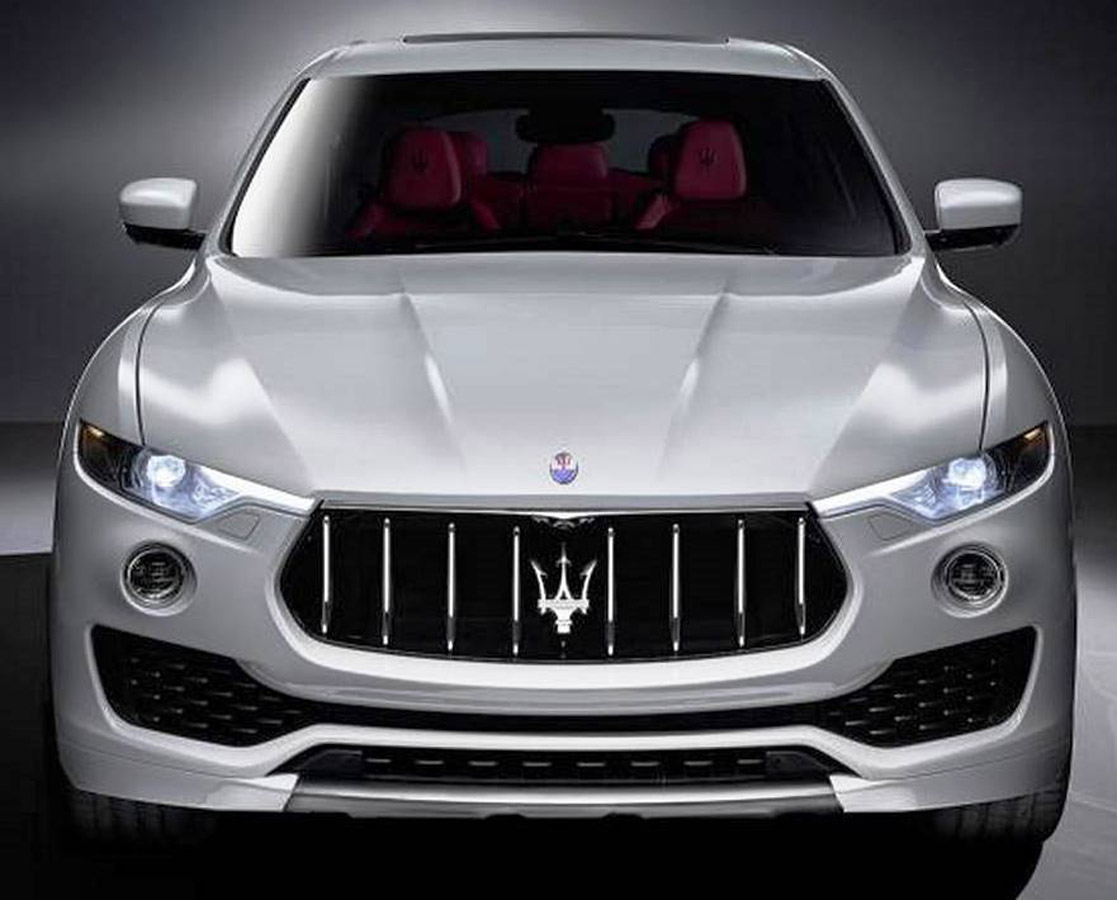
The camera constantly monitors the road ahead to detect the lights of other cars. Sensors connected to the ECU register the driving style and speed and, if the road is clear, the beam is varied to offer the greatest depth and width of view, combined with the rotation of the headlights themselves. In addition to the intelligent control of the beam’s depth and width, there are different automatic lighting modes with each one programmed to satisfy different driving conditions such as driving in a city, on country roads, on the motorway or in adverse weather conditions. There is also the possibility of setting the adaptive lighting for driving in countries where one drives on the other side of the road.
Each of the adaptive lighting modes automatically employs a strategy to best illuminate the road ahead. For example, the Motorway Mode sets the beam to a moderate position between high and low, ideal for high speeds. The Town Mode shortens and widens the beam and deactivates the beam rotation according to the steering angle so as not to disturb pedestrians and oncoming drivers. As for the Adverse Weather Mode, this is activated when the wipers are set to continuous and provides a wider and higher beam on the pavement side and a wider and lower beam on the inner side of the road to reduce reflection and prevent dazzling oncoming traffic.
Colours, Wheels & Customisation
In line with Maserati’s traditions, there is a wide array of options and a variety of colours and materials for the Levante. There are thirteen colours available with three of them exclusive to the model.
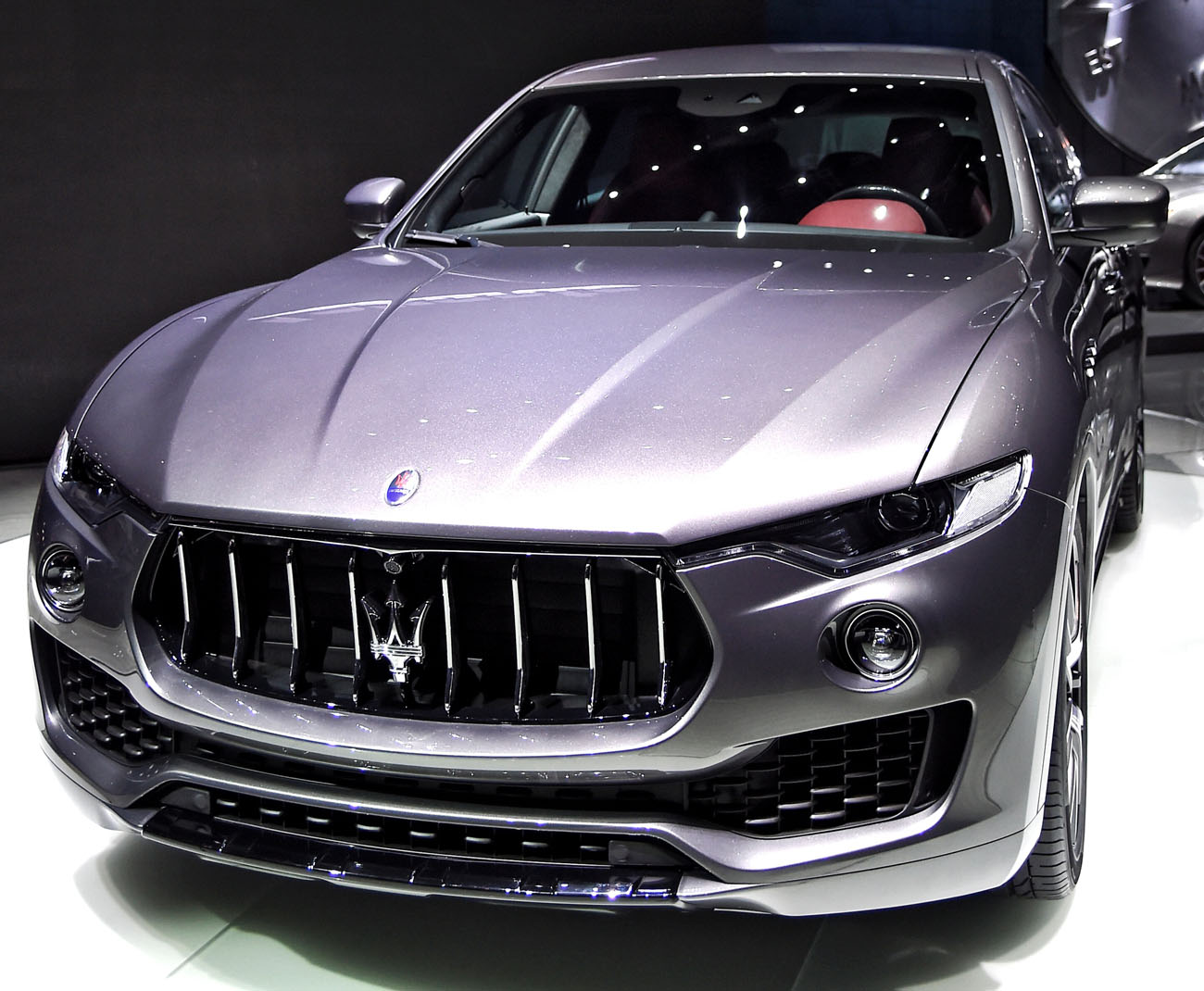
The exterior colour range features two solid colours, Nero and Bianco, three metallic colours, Grigio Metallo, Grigio and the new Verde Ossido, two “metallescent” colours, Grigio Maratea and Champagne, and five in mica, Nero Ribelle, Blu Passione, Blu Emozione, and the new Rosso Rubino and Rame. There is also one pearlescent colour, Bianco Alpi.
At launch, the Levante is equipped with alloy wheels that are not only lightweight and sporty but which also reflect the Maserati design style, with a Trident design neatly integrated into the spokes.
The Maserati Levante 350 hp and 275 hp diesel are equipped with 18″ tyres as standard with a wide range of options – 19″, 20″ and 21″. The front and rear tyres have the same dimensions (standard 255/60 ZR18).
IDue to the increased performance levels, the top 430 hp S version is equipped with 19″ wheels as standard and uses wider sized tyres at the rear axle (295/45 ZR19 with 265/50 ZR19 at the front).
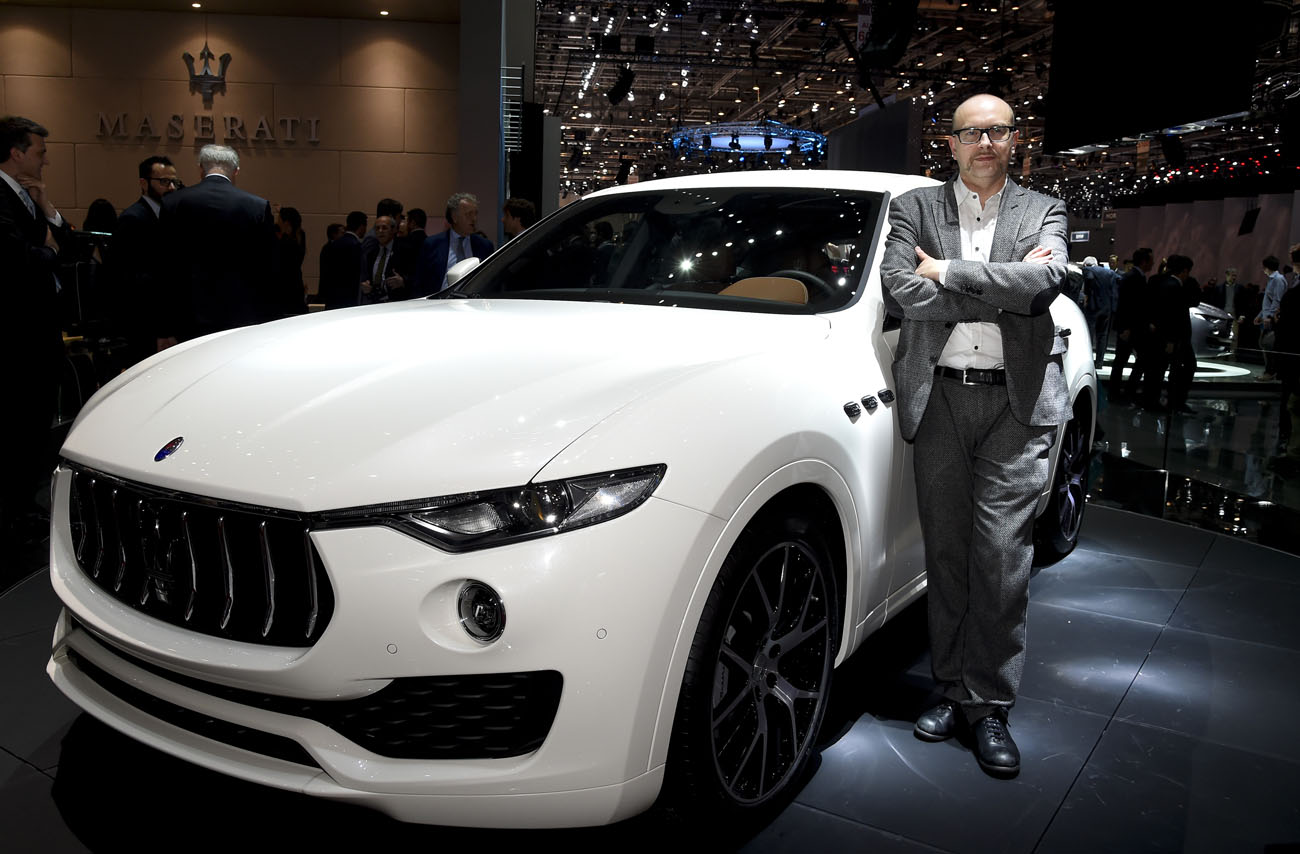
All Maserati Levante wheels are produced using flow-forming technology in order to obtain reduced core thickness and therefore greater lightness, with uncompromising rigidity and strength. All wheels, except the 21″ versions, are available with optional All Season tyres.
As an optional extra, the Levante can be equipped with silver-finish roof rails. Black Gloss roof rails are available in combination with the Sport pack.
Protective skid plates are integral design features of the Levante. They are available in two different colours: Black Gloss, which comes as part of the Sport Pack, and Silver Finish for the other versions. They are designed to protect the lower ends of the car, especially during off-road use, and they also give the car an even more distinctive look.
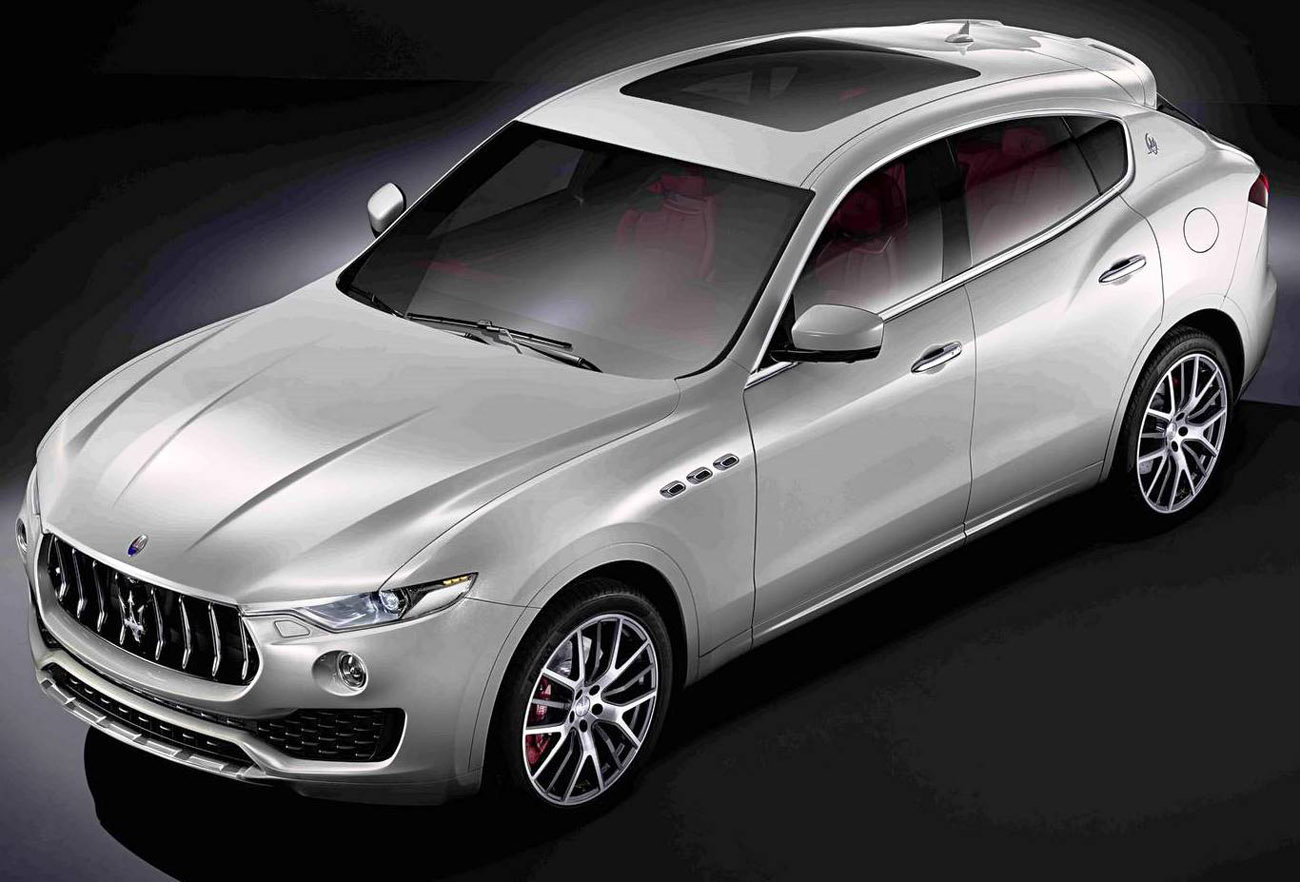
Interior Design
The whole interior is characterised by horizontal tension lines, highlighted by real material elements to create a feeling of absolute harmony between the front and rear passenger compartments.
The interior of the Levante feels like a first class lounge thanks to the standard leather seats. It can be further enhanced with the optional dual-colour leather and, in line with a long Maserati tradition, customers can personalise the interior according to their individual taste. A total of 28 interior colour combinations are available at launch.
The dashboard and the central console are designed in order to accommodate the 8.4″ Touch Screen, the cluster of drive mode buttons, the brand new rotary knob and the air suspension switch.+
The instrument panel follows the classic Ghibli/Quattroporte layout and is backlit with white light that contrasts nicely with the warm cabin lighting. The classic Maserati analogue clock is located in the centre of the dashboard. It features a blue background dial with white backlighting. The interior finish is in aluminium with a chrome surround.
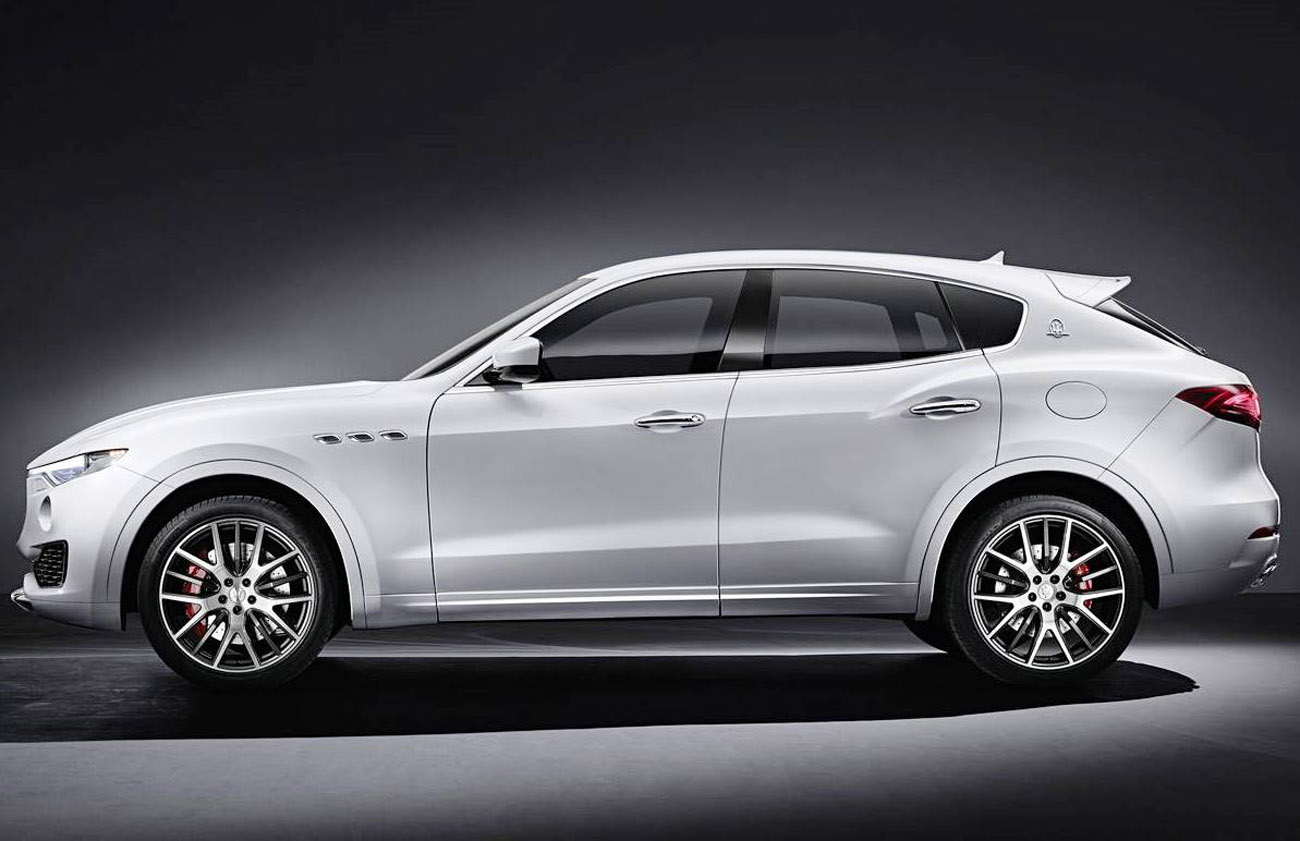
In terms of interior roominess, the car is towards the top of its class. The rear seats comfortably accommodate three passengers thanks to the long wheelbase and the wide body. The two outer seats are designed to offer maximum comfort and lateral restraint. The headroom is among the best in class thanks to the ergonomic configuration of the seats.
The luggage compartment of the Levante has been designed to provide a large and versatile load space of 580 litres. With its regular shape, it can easily accommodate large luggage items. There is a 12V power socket in the luggage area plus three more sockets in the cabin.
The standard power tailgate opens and closes automatically without anyone having to physically lift or pull it down. The system has a special anti-pitching function that immediately stops the closing procedure when an obstacle is detected. The electric system can be activated by the buttons on the tailgate, by the car’s key fob and by a button on the dome light panel.
The standard equipment, also includes, in all markets: leather upholstery (upgraded for the 430 hp), Maserati 8.4″ Touch Screen, Base Audio System with 8 speakers, cruise control, Hill Descent Control, dual zone climate system, wipers with rain sensor, keyless entry (front doors) and power lift tailgate.
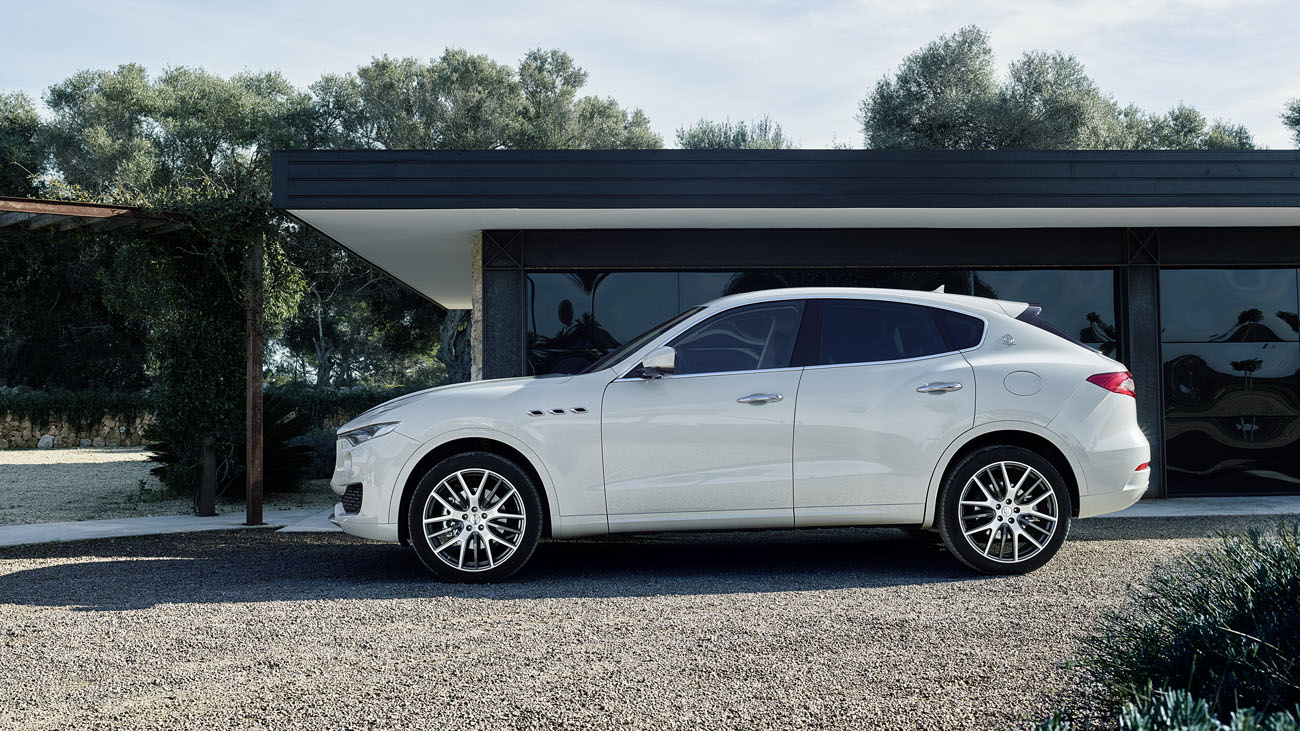
The driver’s seat
The standard leather seats with their wrap-around shape are comfortable, providing excellent lateral restraint during sports driving. The driver can find their most comfortable position by using the six-way electrical adjustment, along with the manual recliner. The front passenger seat has a four-way manual adjustment and, as an option, can be equipped with six-way electrical adjustment like the driver’s seat.
The optional Comfort Seat with twelve-way electric adjustment is the next level of luxury, operating height, depth, backrest, lumbar support and seat angle.
The controls on the seat base follow its profile and are very user friendly. As an option, the electric seat adjustment can include two memory positions for the driver.
Maserati has introduced new sportier front seats for the Levante specific to the Sport Pack. They are perfect for customers who want to give their car a sporty GT feel. Sport seats can be equipped with all types of leathers and colours and come with twelve-way power adjustment as standard.
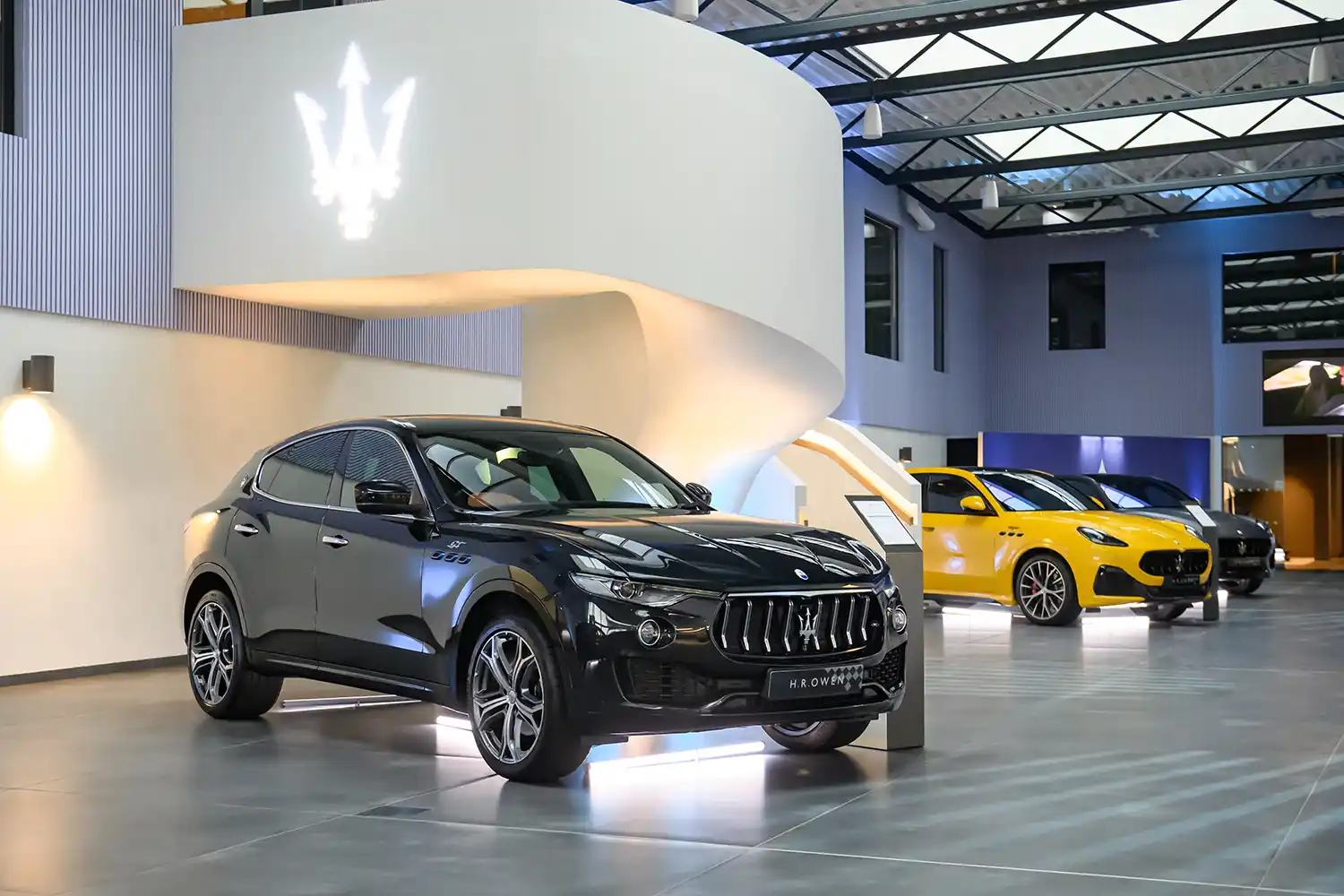
Heated and ventilated seats
Front seat heating adds a touch of personal comfort during cold winter days. The heating can be set to two levels from the Maserati Touch Control Plus display.
Front seat ventilation ensures a pleasant driving experience during long-distance journeys in hot weather. With this option, tiny holes are drilled into the seat’s leather.
The outer rear seats include Isofix fittings and are fitted with a central armrest that houses two cup holders. They also come with a heating system as an optional extra.
The rear seats are split 40/60 and the backrests are foldable in orderto increase the loading space. The inclination of the seat back can also be manually adjusted to five different settings.
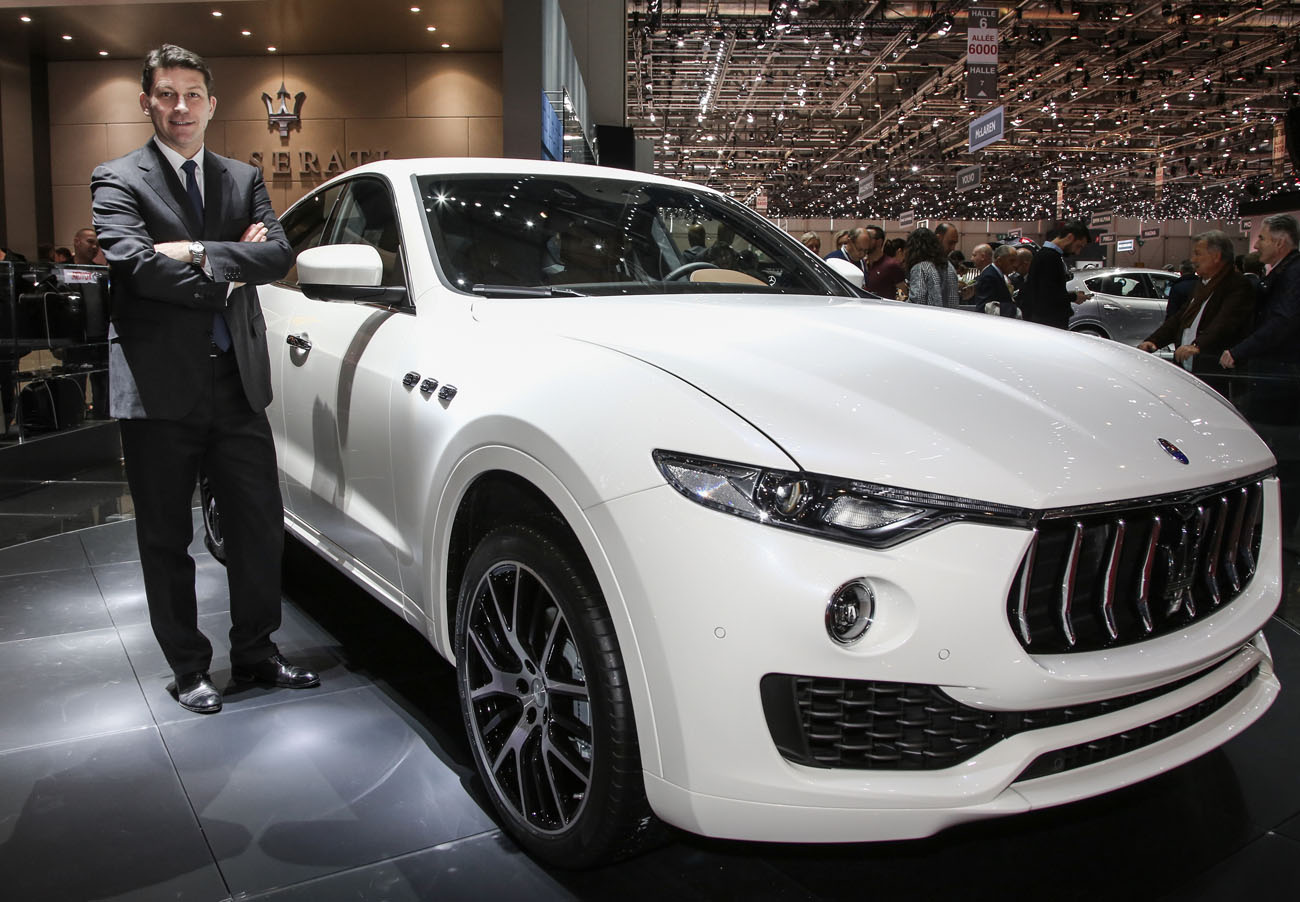
Custom interior
In line with a long Maserati tradition, customers can personalise the interior according to their individual taste.
Right from the launch of the Levante, two dedicated packages ensure there is a marked difference between the Sport and Luxury versions of the car.
Perhaps the best way to personalise a Levante is to upgrade to the full leather option with the door panels and the dashboard entirely upholstered in fine leather. The customer can also choose from a wider range of interior colours and combinations and opt for contrast stitching on the seats and headrests.
The dashboard can be upholstered in leather. The top of the central tunnel can be covered entirely in wood or carbon fibre to emphasise the luxury or the sporty character of the Levante. The same elements are featured on the front and rear door panels.
The soft fabric cabin roof lining is also available in Alcantara®. The signature fabric covers the upper pillars, the ceiling light surround and the front sun visors, adding yet further refinement to the interior.
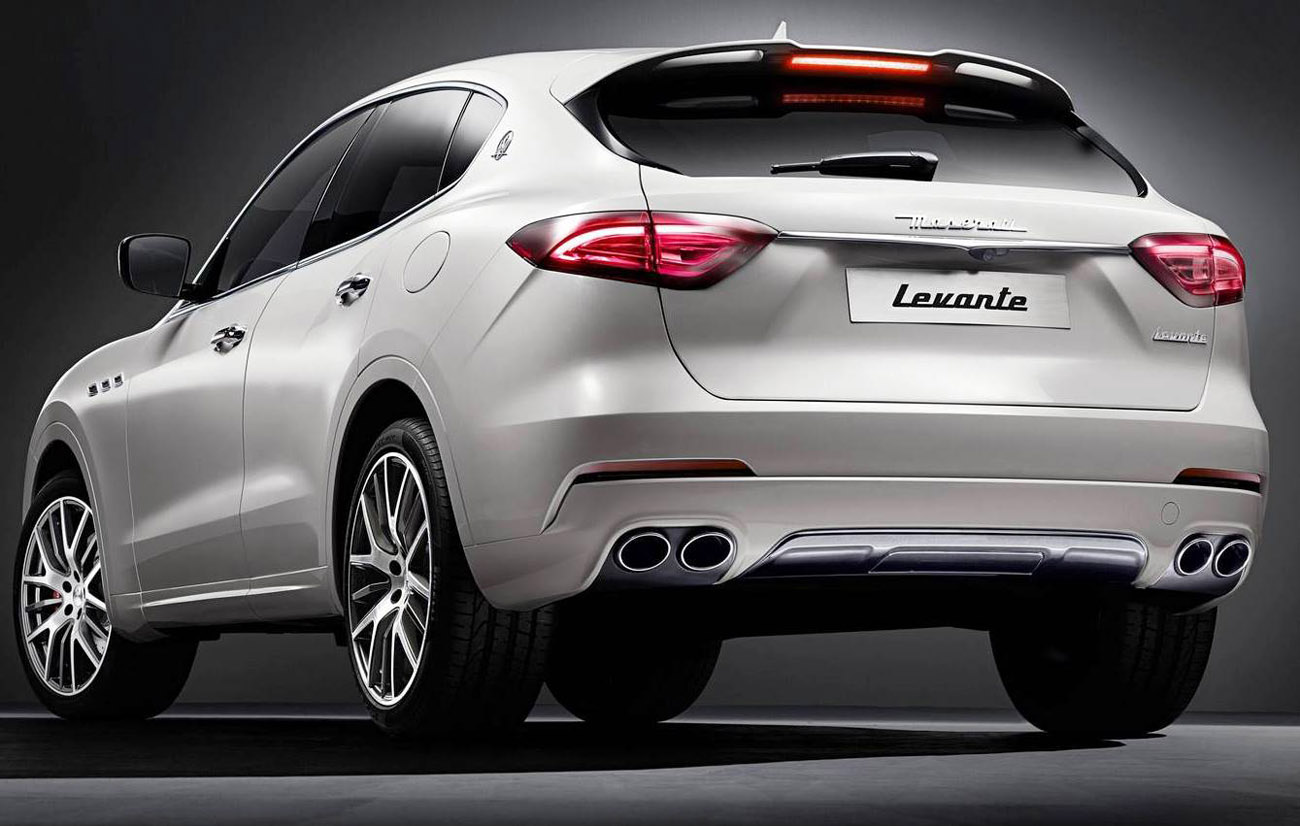
Sport Pack
This package includes exterior and interior design elements that reflect Maserati’s legendary racing heritage: front grille and front/rear skid plates in black gloss, body coloured rear sport spoiler, steel door sills, 12-ways electric Sport Seats, sport power adjustable Steering wheel, body coloured lower parts, 20″ machine polished wheels, red brake calipers, gearshift paddles, brushed steel sport pedals.
Luxury Pack
This package offers a higher level of luxury using exclusive materials and special contents in the finest tradition of Italian craftsmanship. The Luxury Pack includes a chromed front grille, steel door and trunk sills, Premium Leather or Zegna Edition interior, body coloured lower parts, 19″ machine polished wheels, black brake calipers, Harman Kardon audio system, wooden interior trim, 12-way electric Comfort Seats and power rear side sun-blinds.
Zegna Edition
The Maserati Levante can also be equipped with the optional and highly exclusive Zegna Edition pack that combines premium Italian leather with bespoke silk from Ermenegildo Zegna,one of the leading fashion designers in the world and made in Trivero by the Zegna wool mill with a patented process.
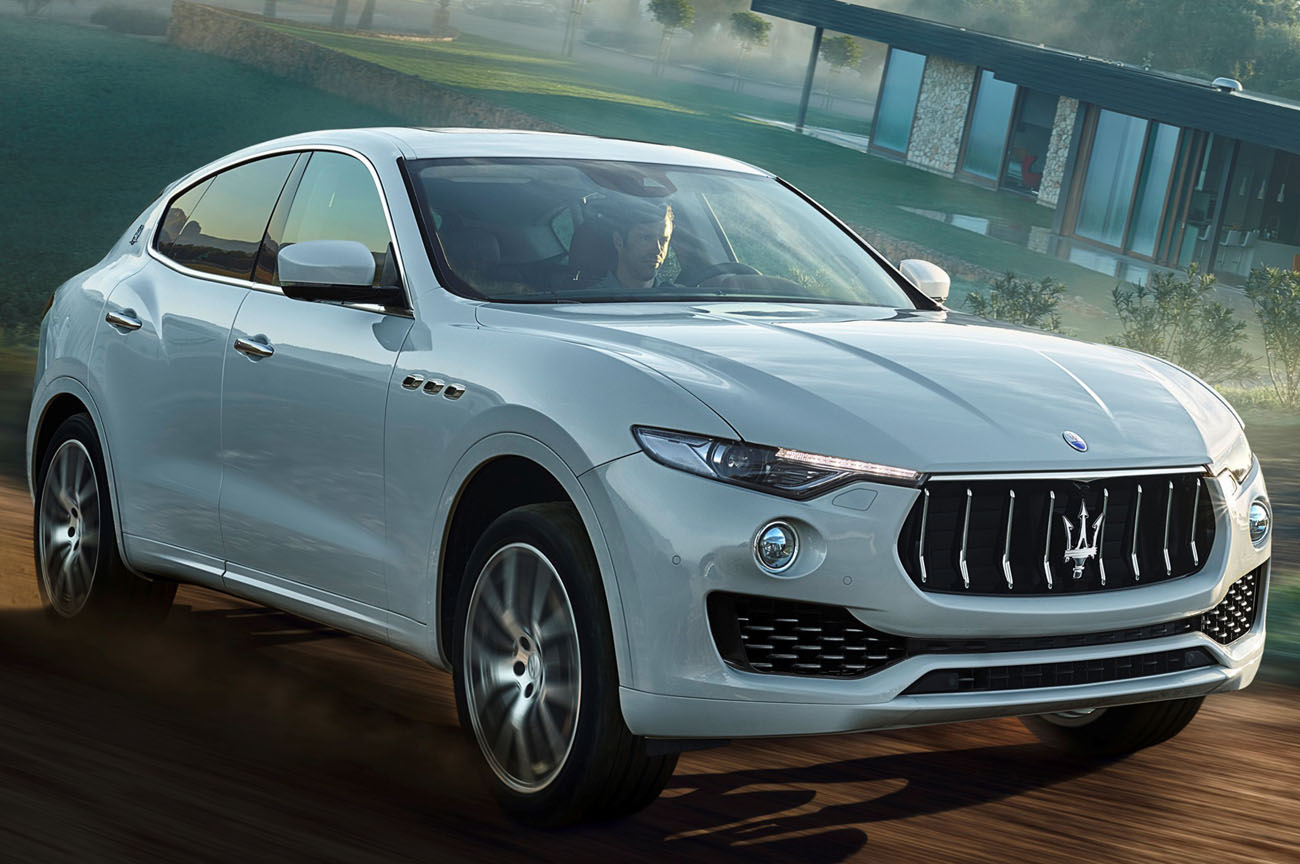
The Zegna pack is an upgrade of the Full Leather option and is available as an option within the Luxury Pack.
The finest leather is combined with natural Zegna Mulberry Silk fibre inserts on the seats, door panels, roof lining, sunshades and ceiling light fixture. The Silk is embellished with a hand-stitched Micro Chevron.
The seats feature a central silk insert with a Macro Chevron weave. The door panels, roof lining and sun visor are covered with Zegna silk jersey. Three different colour combinations of leather/silk and contrasting stitching will be available:
- Tan premium leather / dark grey Zegna Silk / light grey stitching
- Red premium leather / dark grey Zegna silk / light grey stitching
- Black premium leather / dark grey Zegna silk / light grey stitching
An array of optional equipment
Maserati’s sport steering wheel is featured for the first time on the Levante. It enhances the Levante’s sportiness and, coupled with the sport front seats and the brushed steel sport pedals, recreates the environment of a red-blooded sports GT. It can be upgraded with extended carbon fibre insert.
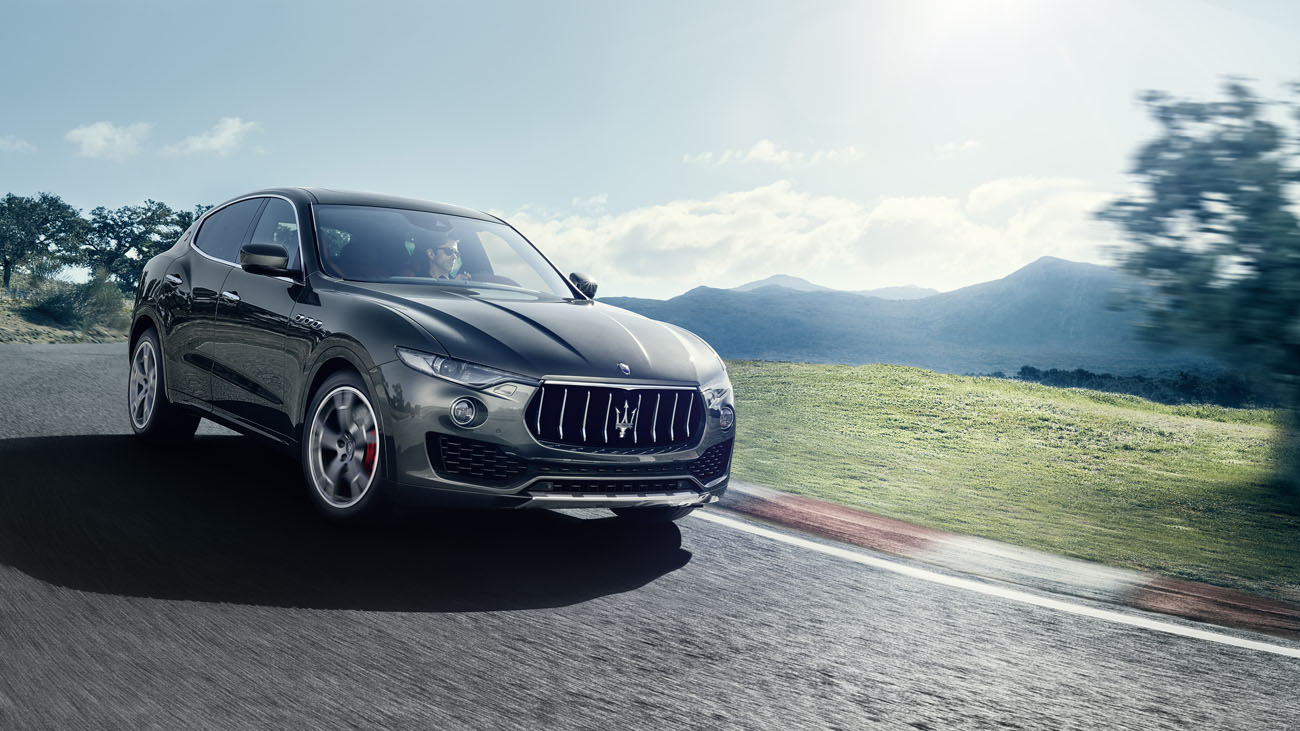
Separately, the signature Maserati elongated gearshift paddles in polished aluminium are also available as an optional extra.
The Maserati Levante can be ordered with a full panoramic electric sunroof offering great sky views. The sunroof is equipped with a sun-blind.
As an optional extra, there is an easy entry & exit system that facilitates the driver’s movements by automatically retracting the seat backwards and the steering column upwards. This option is available in addition to the twelve-way power seats and the electrical adjustable steering wheel.
In LHD markets, the Levante can be ordered with a two-way electric pedal adjustment that ensures the lower limbs are perfectly positioned. The pedal control is positioned in the lower front area of the driver’s seat.
HomeLink® is an optional remote control device integrated in the dome lighting unit in the ceiling above the dashboard. It can automatically operate garage doors, gates, or security lighting systems as the car approaches. HomeLink® can be programmed to operate up to three automatic systems, which is ideal for customers with more than one property.
The optional luggage rails help the owner to manage the rear load space better. The Levante can be ordered with chrome luggage compartment sills and doorsills for an extra touch of class. The door sills can also be both chromed and illuminated.
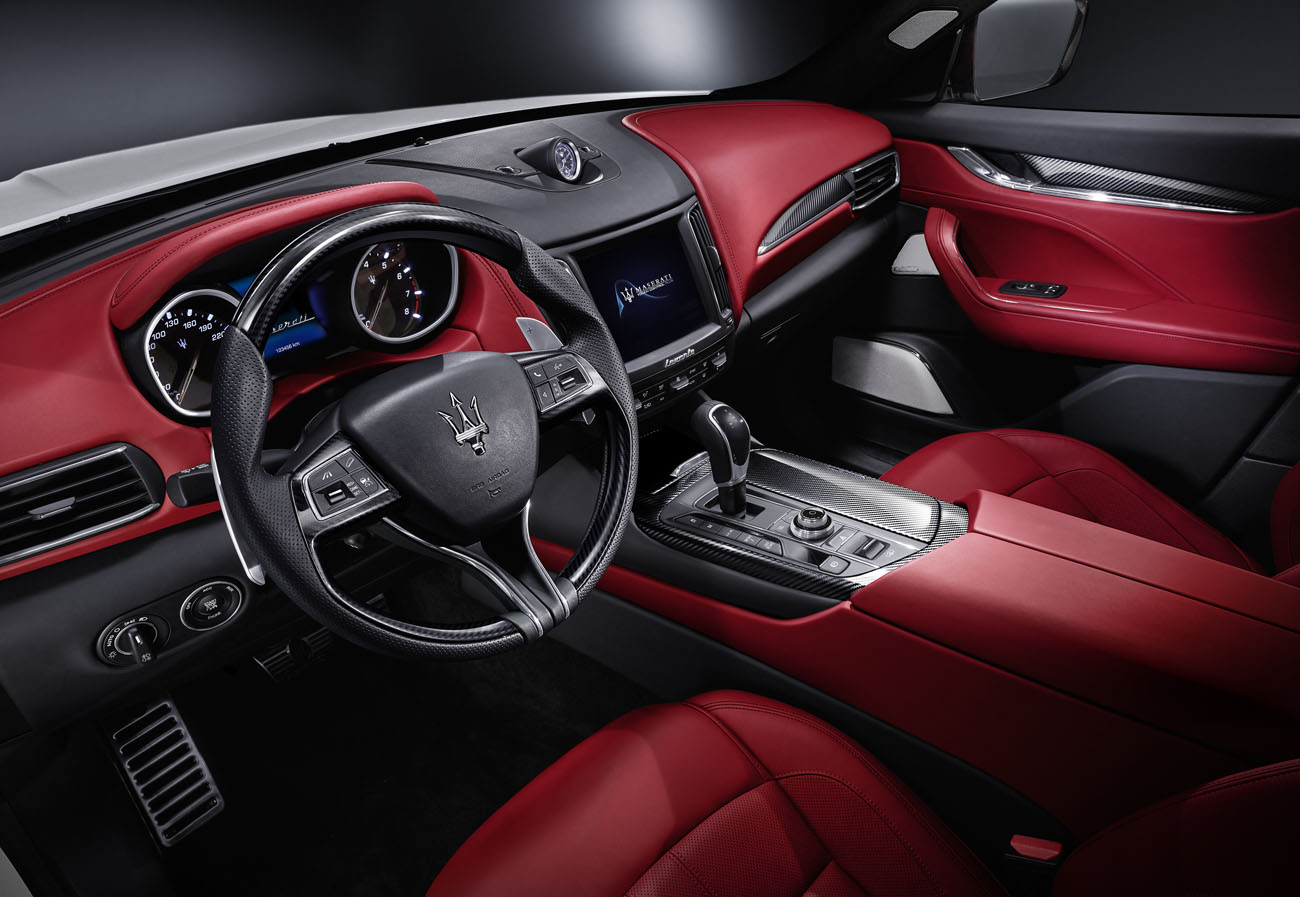
The optional electric rear side sun-blind can be activated by rear passengers using the rear window controls.
The glove box lock can be activated and deactivated via the Maserati Touch Control Plus Screen using a four-digit PIN.
The Remote Start* system replaces the external lights function (‘Panic’ in the USA) on the key fob with a remote ignition function. Pressing the button twice from a distance of up to 500 metres turns on the engine, along with the climate control function, raising the comfort level when the driver and passengers get in.
The Maserati Levante can be ordered with double laminated acoustic glass for the rear windows that reduces external noise and guarantee excellent temperature stability. For a total privacy, the rear door windows and the fifth door window can be ordered with darkened glass.
The power tailgate can be further enhanced by the optional kick sensor that is activated by foot movements thanks to sensors positioned under the rear bumper.
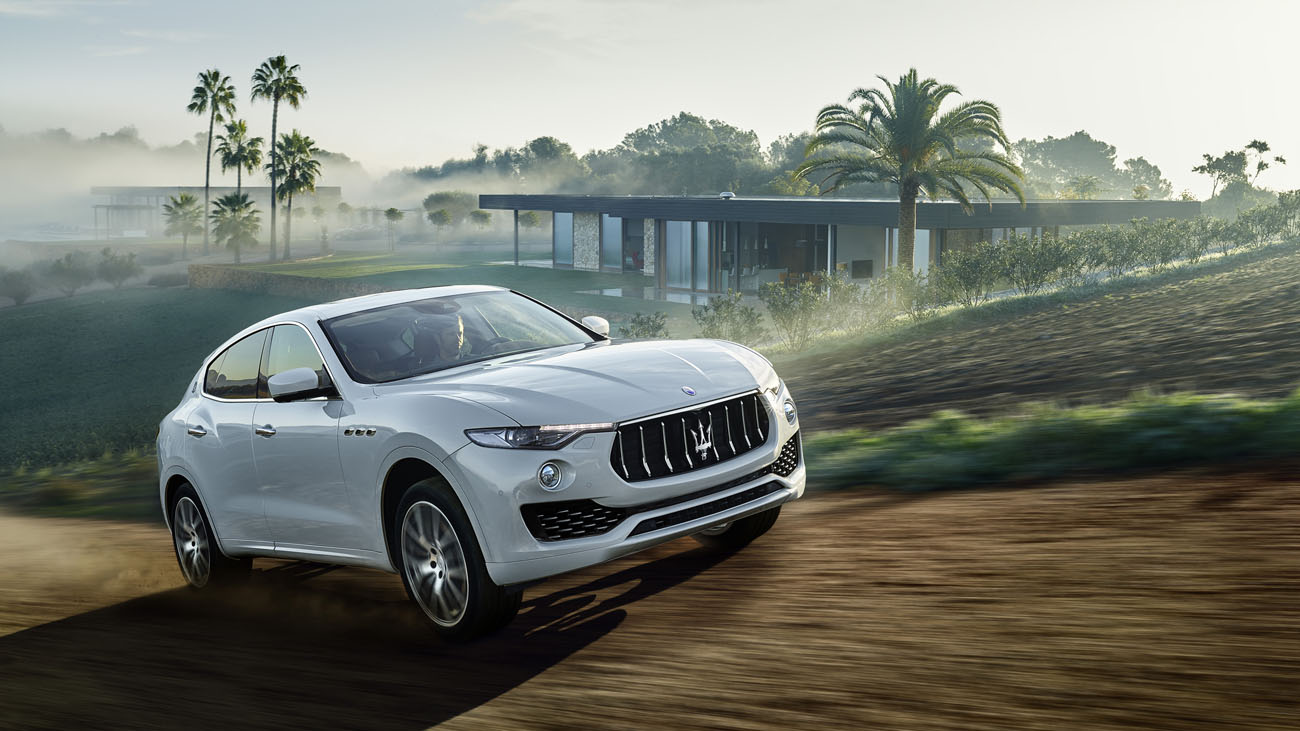
For the first time in Maserati’s history, a tow bar is available as an optional extra. The Levante can tow a trailer of up to a maximum of 2,700 kg.
Onboard Comfort
The system benefits from new features such as Sat radio, Pandora internet radio, and downloadable apps. The platform has also been upgraded to include the AHA function, an addition to the Maserati Touch Control Plus which extends the AM, FM and DAB digital radio with a network connection option: the AHA function dialogues with the user’s network-connected mobile device to give access to on-line services (radio stations, programmes, etc.) while on the move. The system is also compatible with the most common smartphone mirroring functions and with Siri Personal Assistant.
AUX, USB and SD Memory Card inputs are located inside the compartment at the front end of the central console.
For rear seat passengers, there are two USB ports inside the compartment located at the rear end of the central console. All the USB inputs allow data exchange and will charge the connected source.
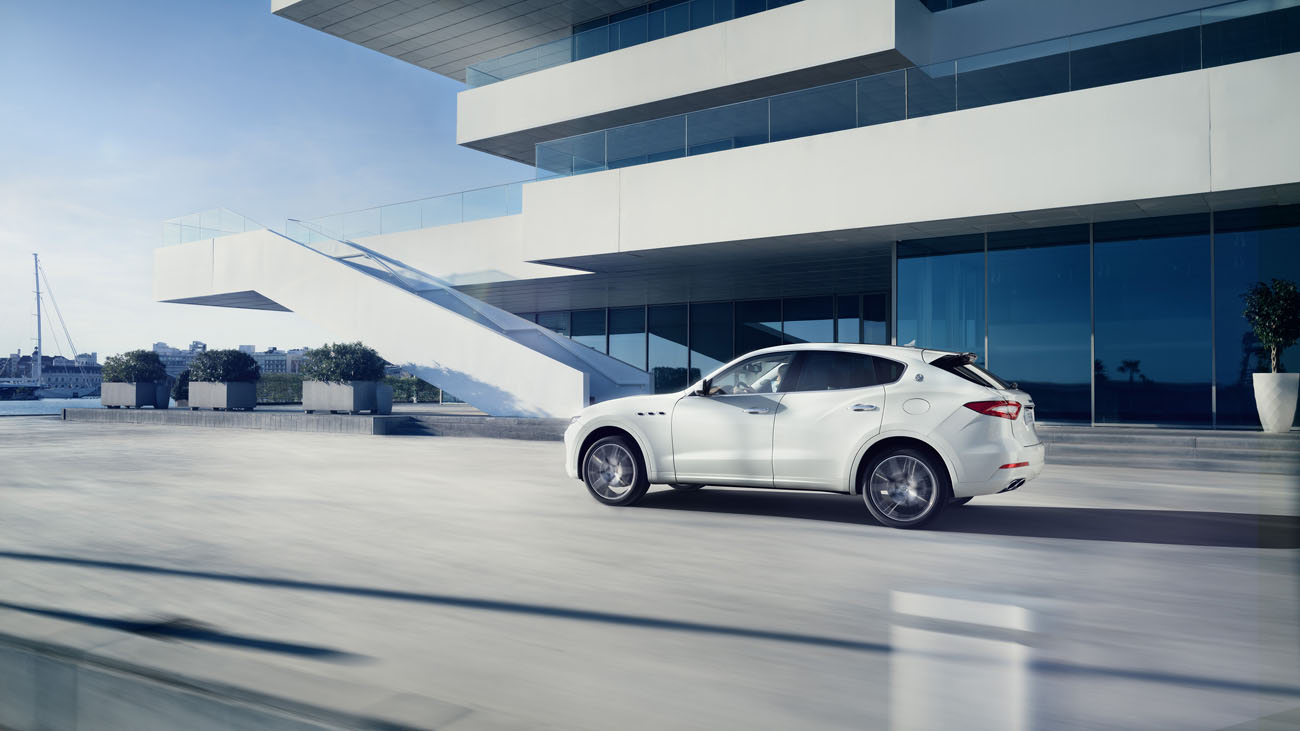
Maserati 8.4″ Touch Screen
The Maserati Levante boasts a highly responsive interface unit. Using the Maserati Touch ControlPlus (MTC Plus) with its 8.4″ capacitive touchscreen display, the user can control the on-board systems simply and intuitively. The high resolution screen works like a tablet, recognizing drag, scroll, swipe and rotate gestures. The system includes radio and Bluetooth and can feature satellite navigation.
Using the Aux-in and USB sockets or the SD card reader, the user can play music or view images. The MTC Plus also controls front seat heating and ventilation, steering wheel heating and the rear window blinds, if fitted. The MTC’s menus have options for configuring the car’s main settings. The system’s various menus are always available via the icons displayed at the bottom of the screen.
User friendly Rotary Control
This new control is positioned below the gearshift. With the upper knob in “Radio” or “Media” mode, the user can adjust the volume or the tracks being played. The control also allows the user to adjust the beeping sound of the park assist system.
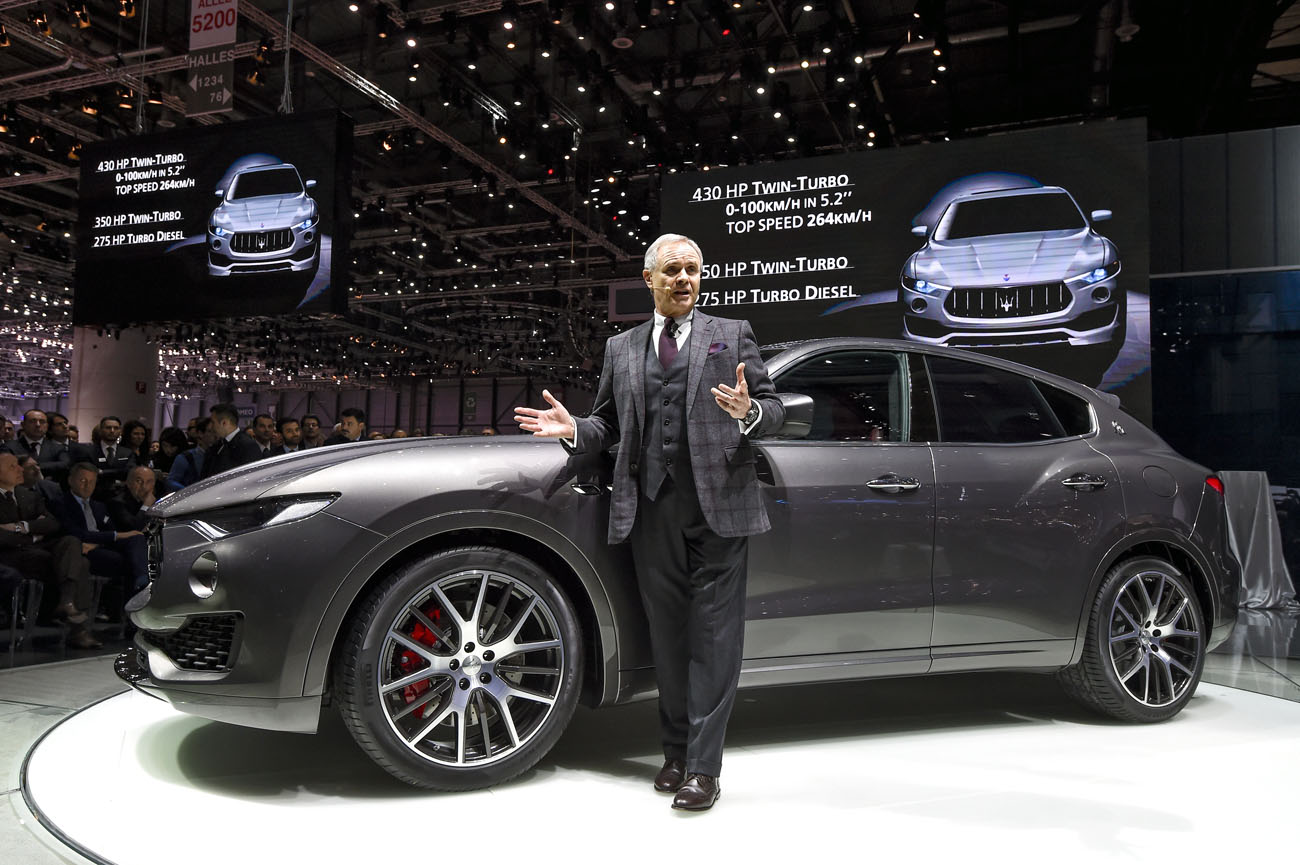
With the bottom knob in “Radio” or “Media” mode, the user can scroll through the radio stations available or stored in any connected external device and press “Enter” to make a selection. In any other mode of the MTC Plus, the bottom knob is used to scroll through the list of available options, followed by “Enter”.
State-of-the-art Sound Systems
The standard Base sound system has 8 speakers driven by the head unit. The set-up includes two 19 mm tweeters in the dashboard, a 165 mm woofer in each door, and two additional 19 mm tweeters in the rear doors.
Premium Harman Kardon System
The optional Premium Audio System from Harman Kardon, included in the Luxury Pack, provides outstanding power and quality of sound. The system has a 900-watt class D amplifier and 14 speakers. It includes a black finish grille pattern, 25 mm tweeters, 165 mm mid-woofer, 80 mm midrange, 12-channel amplifier and bass box subwoofer with 20 litres of internal volume.
Bowers & Wilkins Surround System
When it comes to hi-fi systems, the optional Bowers & Wilkins premium audio system is the absolute top of the range. It is the product of long and painstaking sound engineering studies.
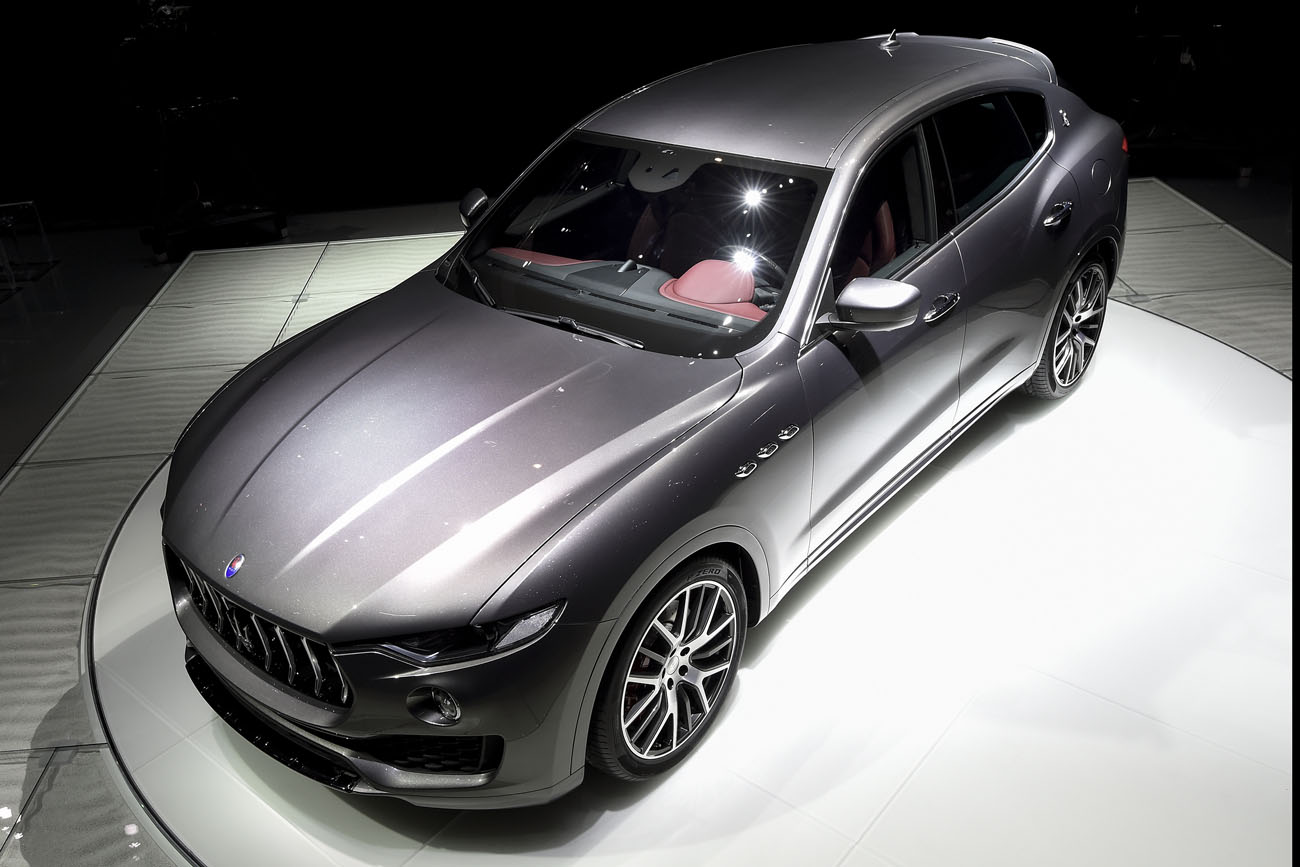
The QuantumLogic™ Surround Sound has a 1,280 W amplifier and 17 speakers. The style of the speakers on the doors and rear shelf differs from that of the basic system, with distinctive technical characteristics. The architecture features a central 100 mm Kevlar midrange cone and three 25 mm tweeters in the centre and on the A pillar. The front doors house a 165 mm woofer and 100 mm Kevlar midrange cone, whilst the rear doors feature a 165 mm Kevlar woofer and 25 mm tweeter. The D pillar hosts two 100 mm Kevlar midrange speakers and 25 mm tweeters. The system includes the Clari-Fi function as standard.
Clari-Fi function
Clari-Fi scans all types of compressed audio files for lost music details: MP3 files, AAC, Satellite Radio, Playback and Music Streaming Services. Once identified, Clari-Fi intelligently corrects waveform deficiencies based on existing music information and audio source quality. It then restores high-fidelity and removes unwanted distortions. The function can be activated by a dedicated button in the HMI.
Climate control system with standard Air Quality Sensor
The automatic dual zone standard climate control system provides outstanding on board comfort thanks to the temperature sensors and the high volume of air it delivers via 13 ventilation ports. The temperature adjustment function, separate for driver and front seat passenger, can be controlled via the MTC Plus (Maserati Touch Control Plus), as well as via a physical control panel under the screen.
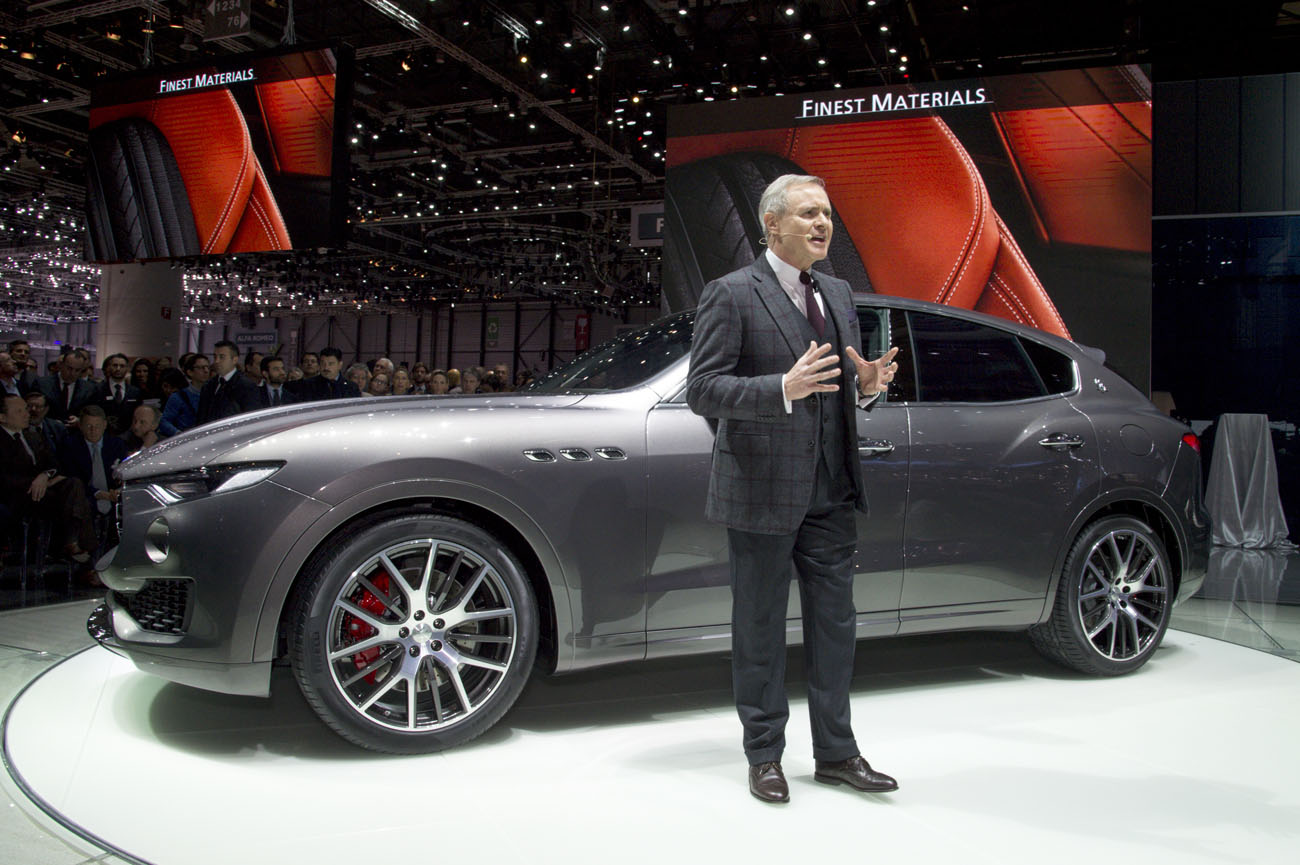
The Maserati Levante is equipped with an Air Quality Sensor offered as standard with all variants. This feature combines an intelligent sensor and a signal analysis system that calculates external pollution levels and prevents polluted air and toxic gases from entering the car’s cabin.
A humidity sensor detects humidity levels in the cabin and increases the airflow from the ports accordingly. As an option, the Levante can be equipped with a four zone climate control system, with two more controls in the rear part of the central tunnel.
An additional cabin heater is available on the Levante diesel and is designed to accelerate cabin heating in cold conditions, which can be useful because of the slower warm-up of diesel engines.
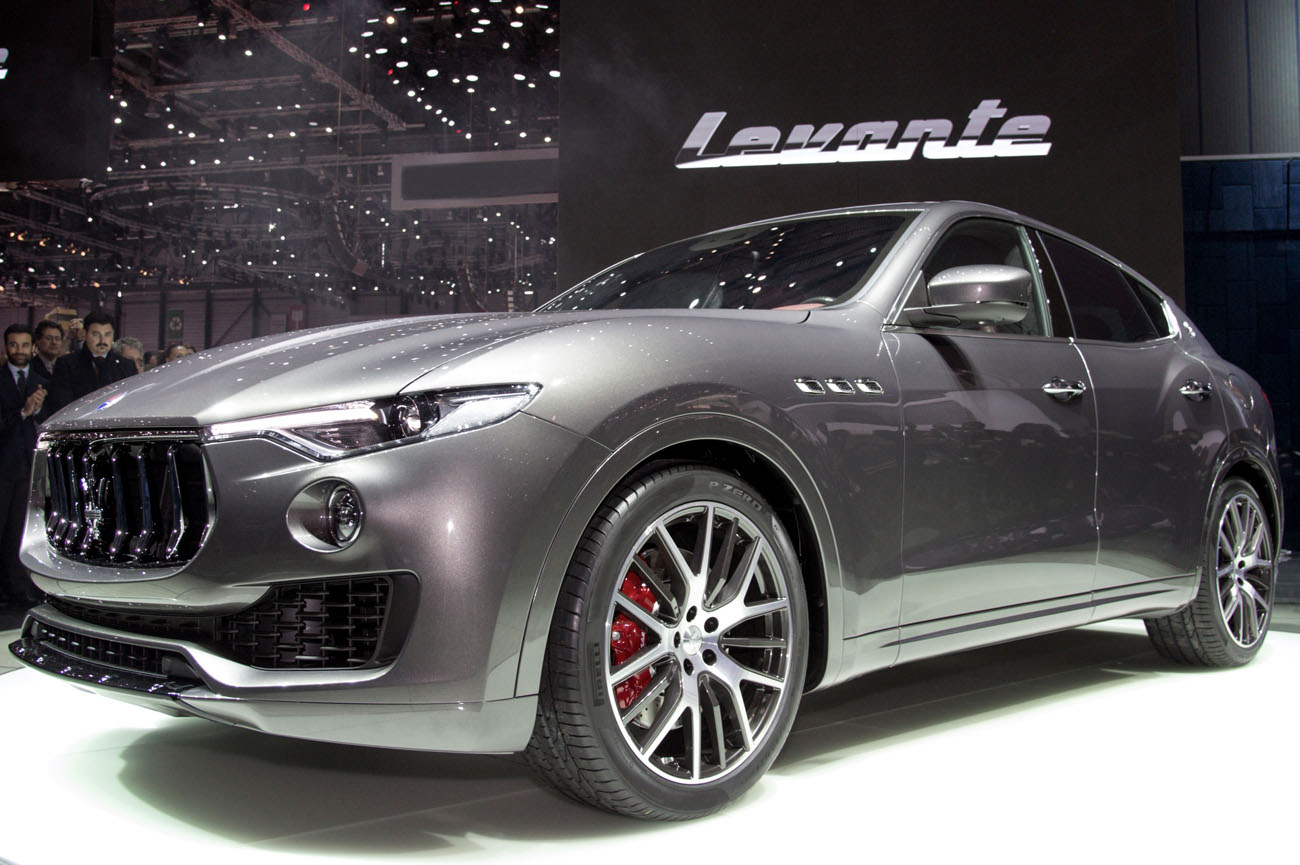
Levante Genuine Accessories
The original Maserati accessories have been designed and developed exclusively for the Levante.
They are tailored to the vehicle’s high quality and functionality standards. The array of options is wider than ever before and ranges from Cargo solutions to useful items, all of which specially conceived and designed for this car.
Due to their low profile, the Multipurpose roof racks in aluminium are an essential element when transporting sport and travel equipment. In this regard, several choices are available: the lightweight and aerodynamic Roof box, with its 410-litre capacity and practical double opening system; the lockable Ski & Snowboard carrier with its soft cover that protects up to 6 pairs of skis or 4 snowboards, and the lightweight Surf or Bike carrier, engineered to be practical, safe and quick to operate.
For transporting up to three bicycles, a compact, lightweight and easy-to-use Bicycle carrier is available featuring a double lock and a reclining mechanism that offers clear access to the luggage compartment even with the bicycles attached.
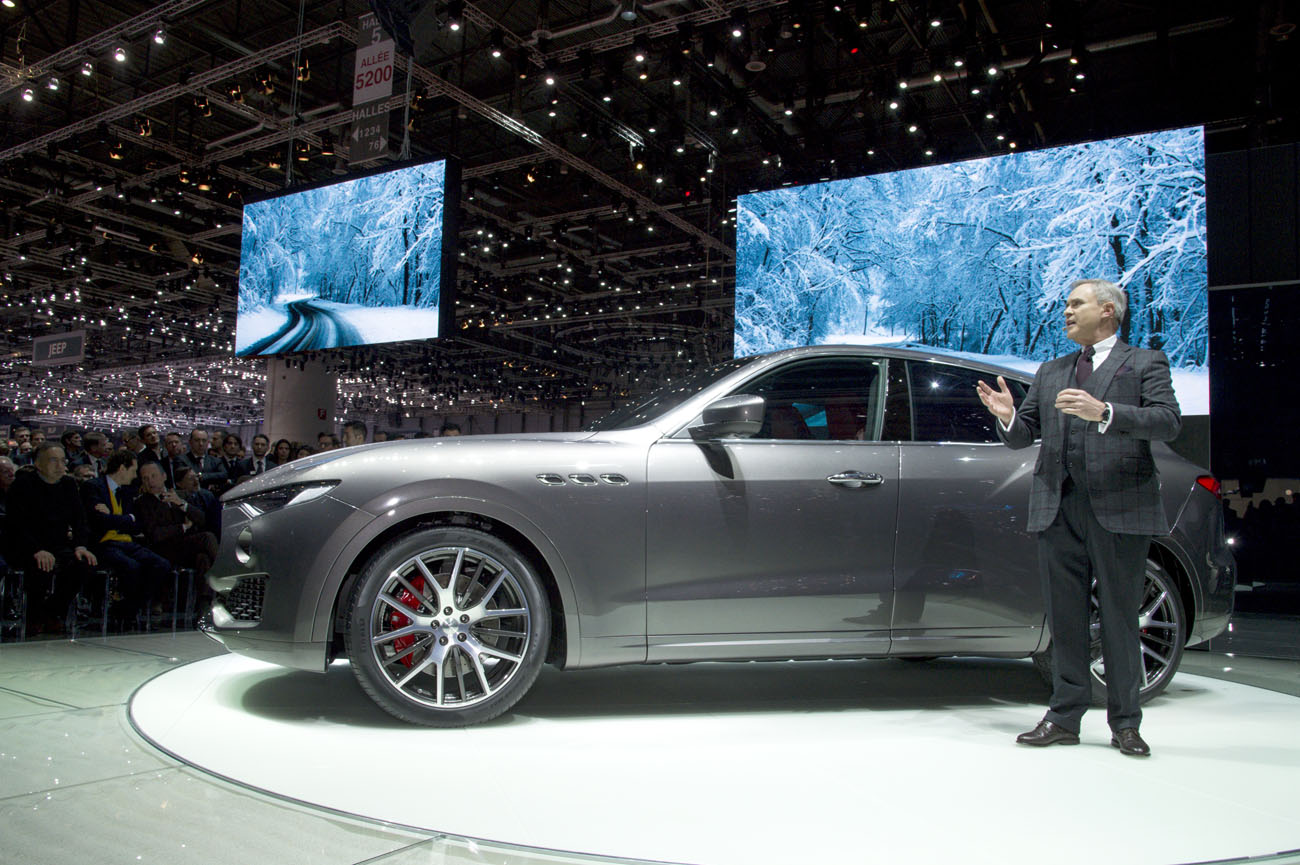
For optimum driving precision combined with absolute comfort, safety and long life on dry and wet roads, Maserati Genuine Tyres are available in the summer, winter and all-season versions, and specifically developed for the Levante. The complete set of wheels is designed to mirror Maserati drivability and style.
Several solutions are also available for the trunk: the Luggage divider to keep items well organized, the Luggage soft box to protect small and medium items in the luggage compartment, and the waterproof, washable, highly resistant, recycled thermoplastic Cargo liner.
For overall product usability, a latest generation iPad holder with advanced infrared function is available.
For children, in collaboration with Peg Pérego Maserati has developed three exclusive Child Seats* integrated with Maserati design, each one corresponding to different weight groups: Group 0+ (0 to 13 kg), Group 1 (9 to 18 kg) and Group 2/3 (15 to 36 kg).
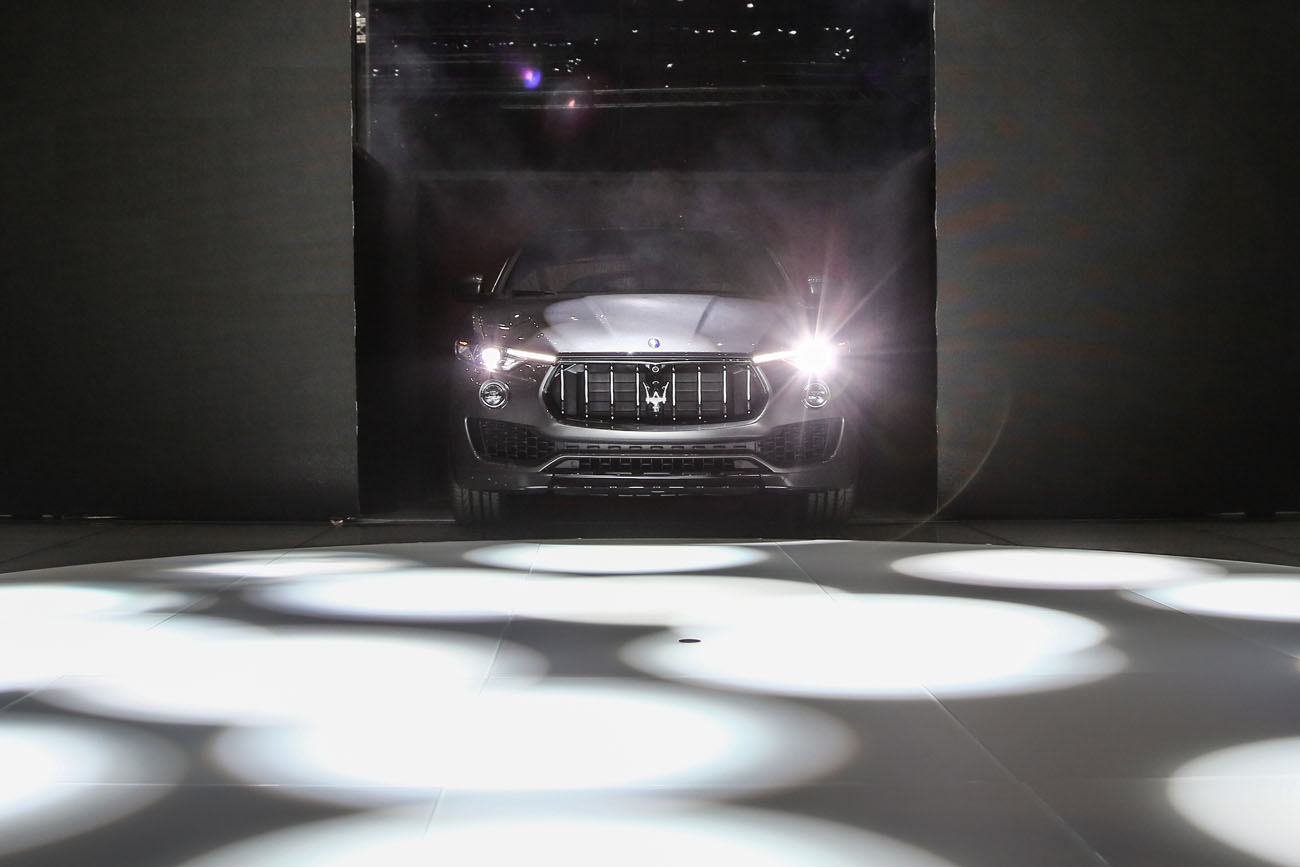
There is also a specific foldable Maserati-Peg Pérego Baby stroller that is compatible with the Group 0+ baby seat.
For the body protection of the Levante a form-fitting Indoor car cover has been designed in signature Maserati blue with grey-contrast details, while an all weather waterproof, breathable and flexible Outdoor car cover in high-tech fabric is also available.
3.0l V6 gasoline engines with 430 & 350 hp
Maserati’s new V6 engines have been a great success since they were introduced in the Ghibli and Quattroporte models. The Levante features the same 3-litre unit with two different power outputs.
The V6 petrol engine is twin turbo with the latest GDI technology developed by the Maserati Powertrain in conjunction with the Ferrari Powertrain development team. This new generation of Maserati engines are more powerful, more exciting to drive and more eco-friendly than ever.
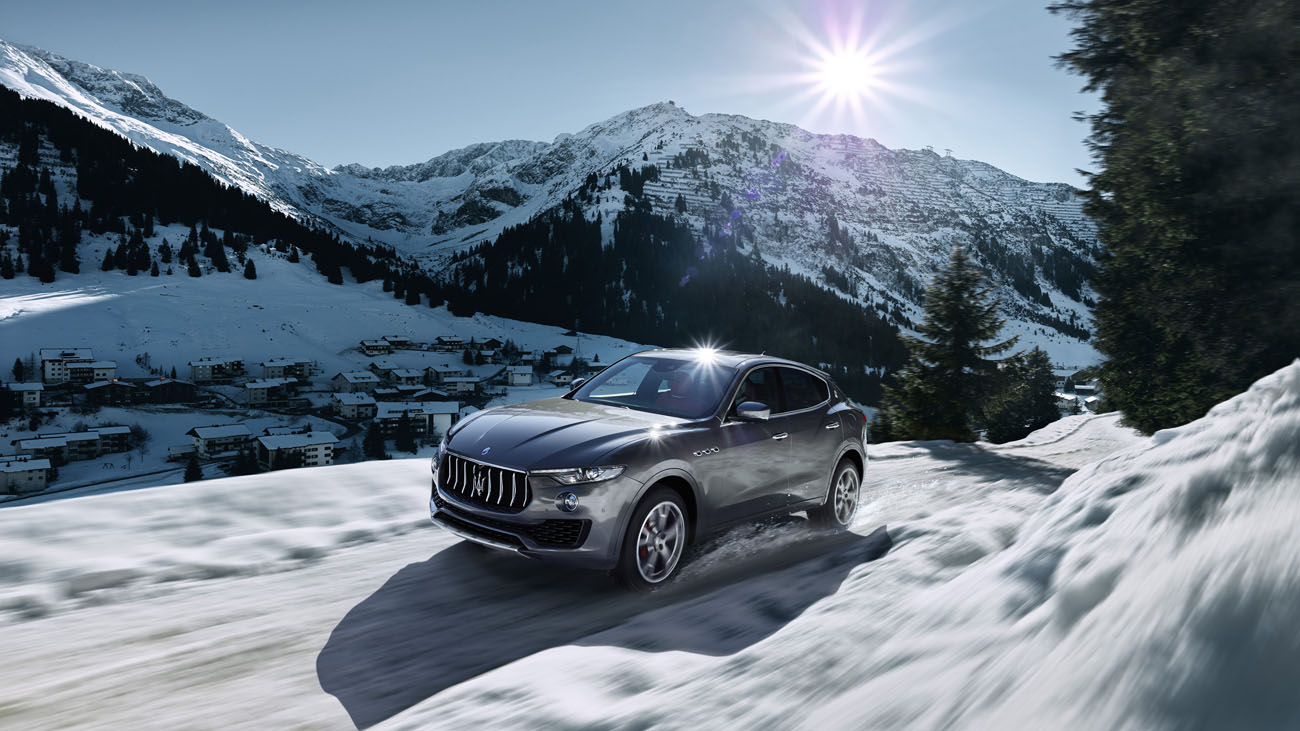
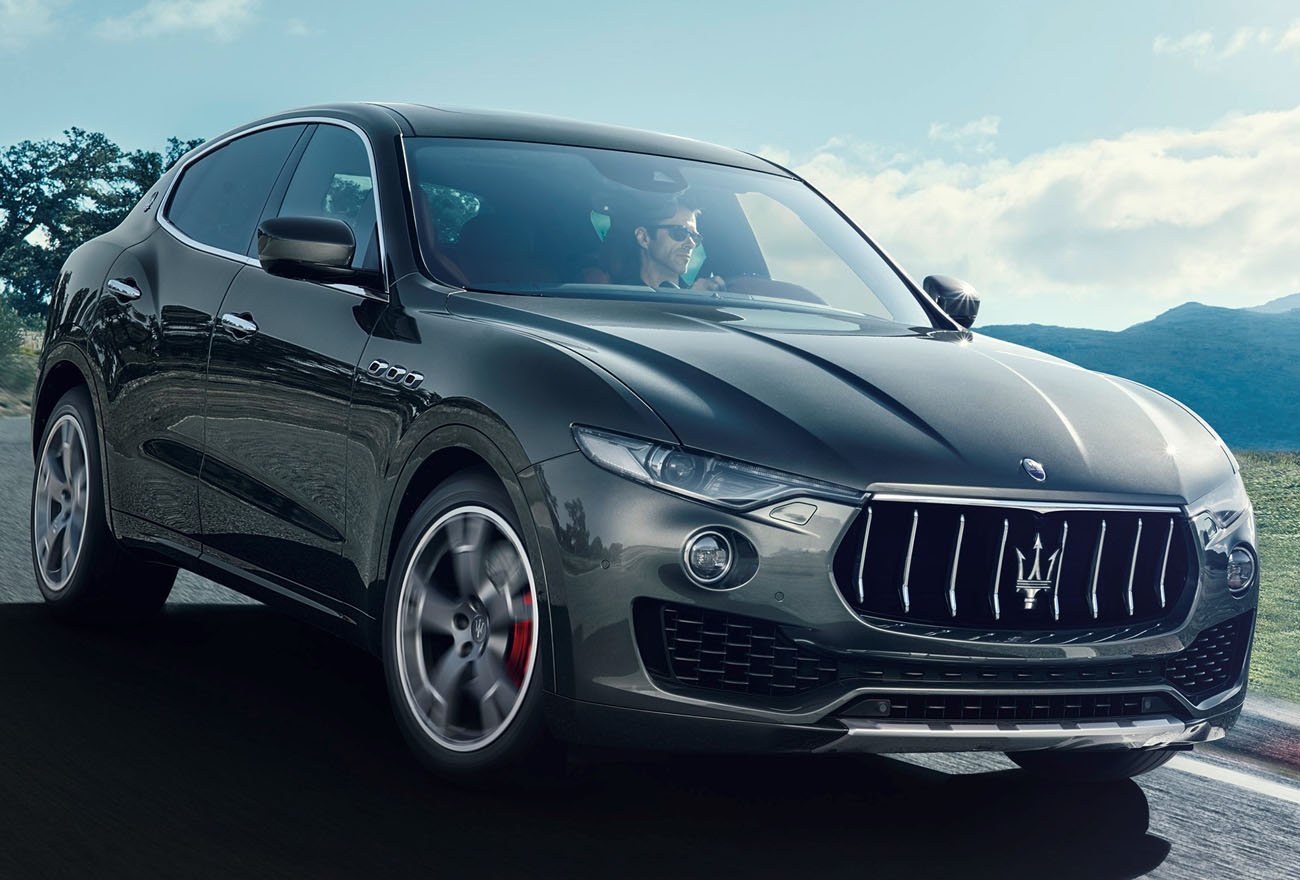
The high efficiency Maserati V6 petrol engine features high efficient fluid-dynamic and combustion, low inertia parallel twin turbos, double continuous cam phasers for each cylinder head and high-pressure (200 bar) fuel injection.
Maximum torque is available well below 2,000 rpm ensuring superb day-to-day drivability. In the “sport” driving mode, the exhaust by-pass system provides a unique Maserati sound experience.
The 430 hp version of the twin turbo V6 engine has already made its mark in the Ghibli, and has now been improved even further to deliver an extra 20 hp.
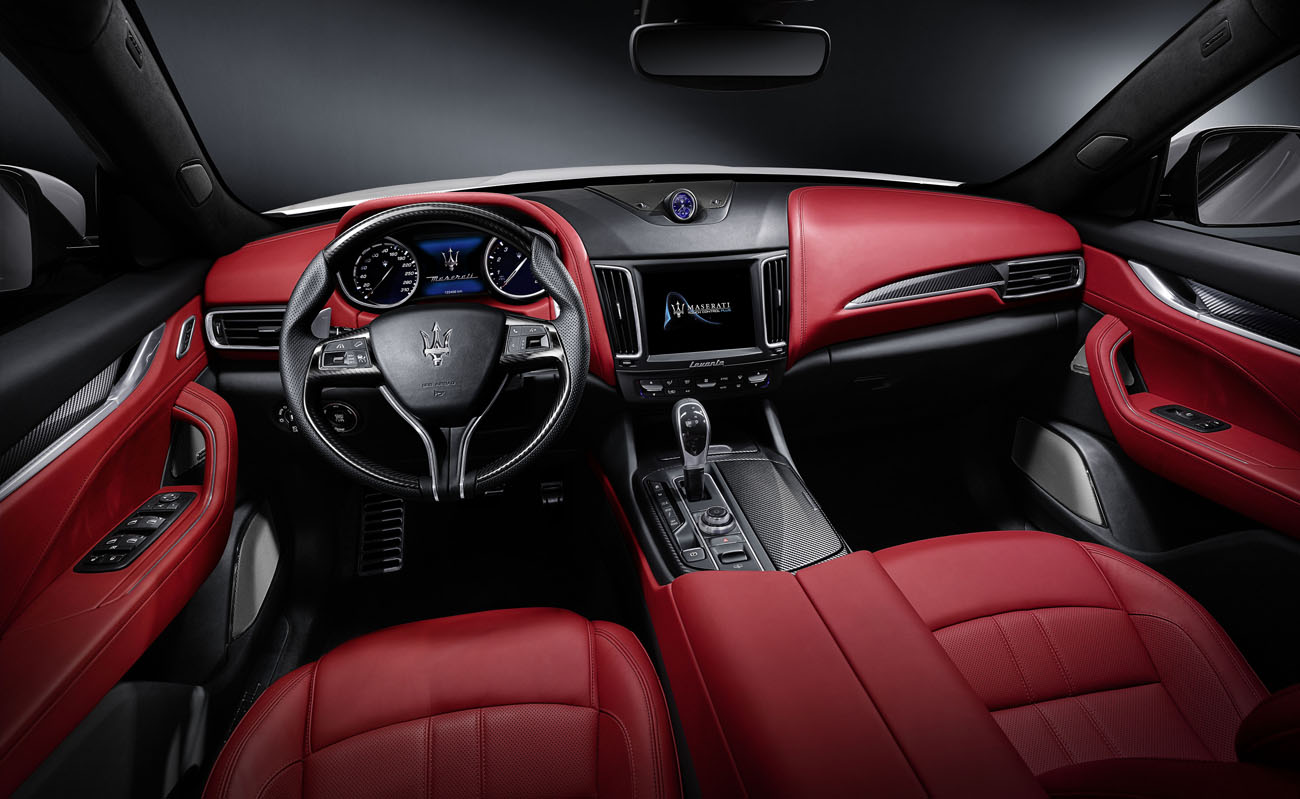
With 321 kw (430 hp) of power @ 5,750 rpm and 580 Nm flat torque in “sport” mode between 1,750 and 5,000 rpm, it delivers a powerful driving experience. In “normal” driving mode, the torque rises to 500 Nm in the lower rev range reaching 550 Nm threshold @ 5,000 rpm.
The V6 engine features advanced valve control technology with hydraulic roller finger followers and four Cam Phasers, twin turbocharging and direct injection-ignition system.
The specific torque of the V6 engine is at 194 Nm per litre; this figure is the best in the luxury SUV class as is the specific power of the Italian unit (144 hp/l).
The Maserati Levante S 430 hp accelerates to 100 km/h in 5.2 seconds and has a top speed of 264 km/h. The 430 hp engine is in line with its competitors in terms of fuel consumption – 10.9 l/100 km on the NEDC test cycle – and CO2 emissions (253 g/km).
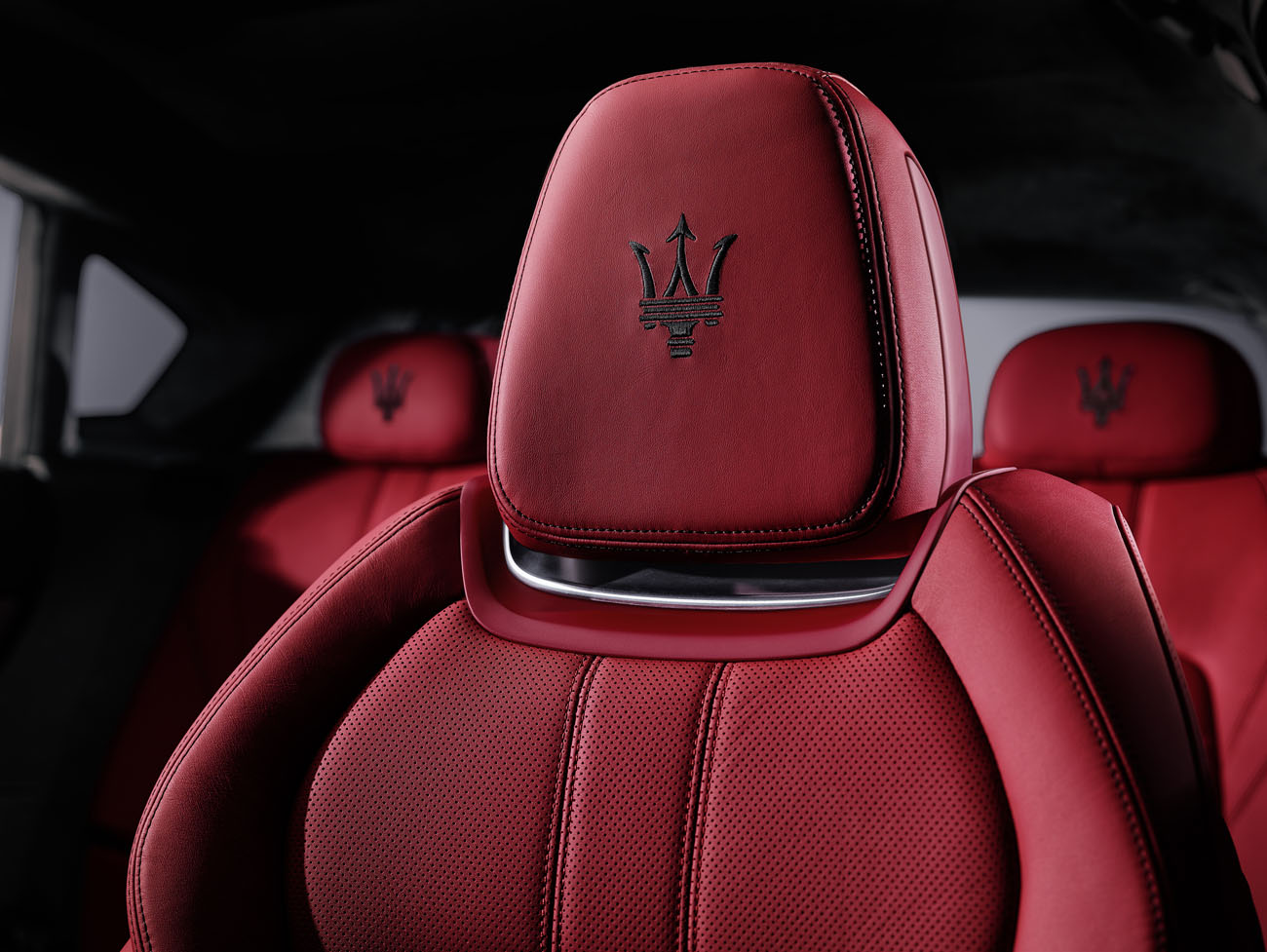
The Maserati Levante’s 3-litre 350 hp engine has been designed to offer an outstanding driving experience along with a frugal use of fuel. It delivers 500 Nm torque from 1,750 up to 4,750 rpm. Equipped with this V6 engine, the Levante reaches 0-100 km/h in just 6.0 seconds and has a top speed of 251 km/h, a combined consumption of 10.7 l/100 km on the NEDC test cycle and 249 g/km of CO2 emissions.
In the best Maserati tradition, the petrol engine’s exhaust system is controlled by pneumatic valves to maintain the rich aural signature of the brand. In the default driving mode, the bypass valves are closed for a comfortable and discreet engine sound.
By selecting the “sport” mode, not only do the car’s handling parameters change, but the exhaust valves are opened, providing the shortest possible way to the exhaust gases. This gives the Levante its maximum engine performance and the unique Maserati engine sound. Beneath the rear bumper, the exhaust gases emerge through two double tailpipes in polished steel.
3.0l V6 turbodiesel engine
Like the Ghibli and Quattroporte, the Levante is also available with a powerful V6 turbodiesel engine.
The 3-litre V6 is manufactured by VM Motori. It develops 202 kw (275 hp) of power and a crushing 600 Nm of torque, 90% of which available below 2,000 rpm. The Levante 275 hp accelerates from+0-100 km/h in 6.9 seconds and makes it to 230 km/h even though it emits just 189 g/km of CO2 and has a consumption of 7.2 l/100 km on the NEDC test cycle.
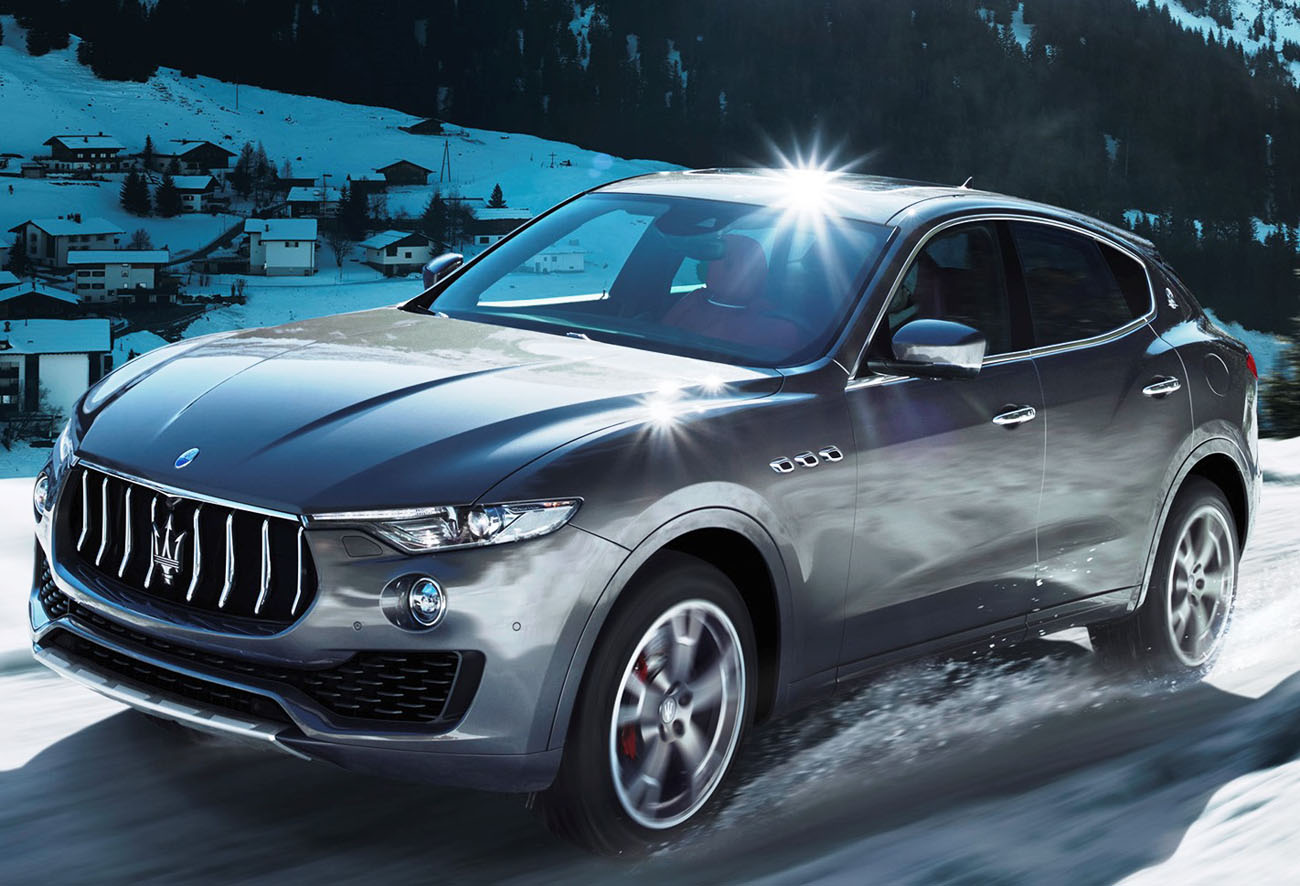
The engine uses Common-Rail direct-injection with reduced dwell time-injectors. The maximum injection pressure of the common rail system is 2,000 bar while the system is able to perform up to 8 injections in a single cycle and features Injection Rate Shaping technology. The IRS creates a continuous injection profile that improves performance and reduces emissions, assisted by a sophisticated Exhaust Gas Recirculation system.
Other significant features are a ball bearing variable-geometry turbocharger with variable nozzles and a fabricated exhaust manifold with air-gap. The shaft rotation on ceramic ball bearing of the turbo system reduces friction by 50% and, as a result, reduces turbo lag and improves boost and torque. There is a significant reduction in emissions – 8% less Nitrogen oxides (NOx) and 9% less Hydrocarbons (HC) in the NEDC cycle. Low friction turbo has more benefits, like better cold start behaviour, quicker boost time, significant torque improvements and reduced fuel consumption.
Using steel instead of cast iron, along with the use of “Air Gap Technology”, means that the engine can reach higher temperatures, improving the air-flow speed to the turbo for even better performance.
The Start & Stop system on the diesel version reduces fuel consumption and CO2 emissions by up to 6%. Start & Stop is automatically disabled in both the “sport” and “ESC off’ modes.
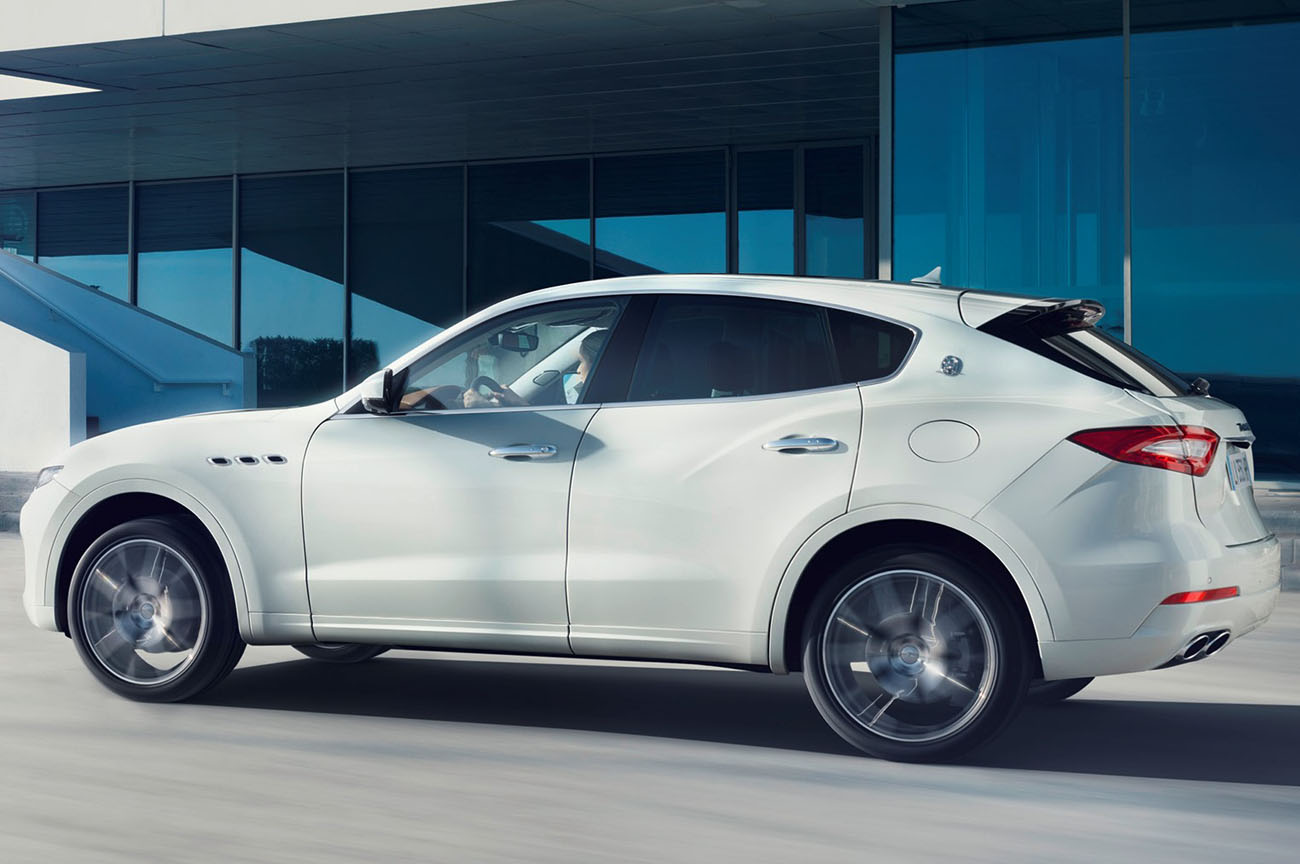
Active Sound exhaust
A thrilling engine sound is essential for every Maserati and the Levante Diesel is no exception thanks to the Maserati Active Sound system. Two sound actuators, fitted near the exhaust tailpipes, accentuate the engine’s most attractive tones and adjust them depending on the way the car is being driven. When the driver presses the “sport” button, the sound becomes more resonant and remarkably inspirational for a diesel. Just the soundtrack you would expect from a Maserati.
8-speed automatic & Q4 AWD
The ZF AT8 – HP70 gearbox ensures improved comfort, faster gear shifting, better fuel consumption and reduced Noise, Vibration and Harshness. It provides seven dedicated shift modes that can be selected from the cluster on the left of the gear knob: “normal”, “sport”, and “off-road” in both automatic and manual mode and the I.C.E. mode – for Increased Control & Efficiency – that was introduced for the first time in the Ghibli and Quattroporte sedans.
By default, the car is set to “auto normal” mode. This offers the right balance between ride comfort, reduced consumption and sporty character, performing smooth gear changes at low engine speeds.
The selectable “auto sport” mode enhances the powertrain’s sportiness with faster gear changes in higher revs. The sportiest mode is “manual sport”, which allows the driver to stay in the selected gear even when the engine reaches the rev limiter.
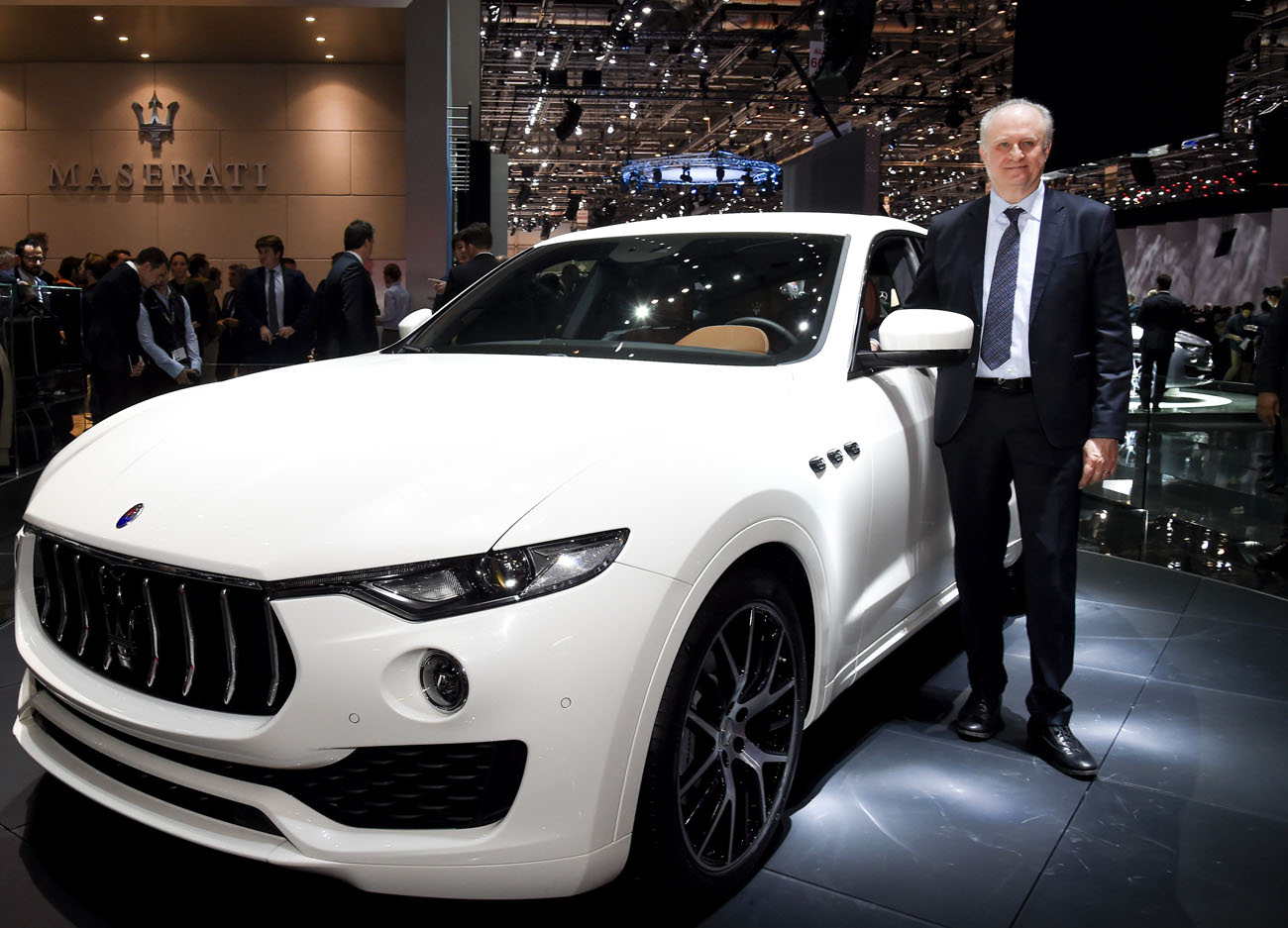
In “off road” mode, which is introduced for the first time in a Maserati,when the driver selects a chosen speed the car continues at this pace, even when climbing. This is extremely useful when the driver has to concentrate on a challenging climb; the car will effectively drive itself, whilst the driver has only to manage the steering wheel.
With “auto off-road” mode selected, the transmission recognises the different types of terrain, interacts with the ESP and alters its shifting response accordingly.
In the I.C.E. mode, which will be familiar to Ghibli drivers, gearshifts are almost unnoticeable for unrivalled ride comfort.
Q4 AWD on-demand system
The Maserati Q4 All-Wheel Drive system comes as standard in all versions of the Levante. It is based on an electronically controlled, multi-plate wet clutch, installed into a transfer case linked by a driveshaft to the front axle.
Q4 AWD system is developed to deliver a typical Maserati rear-wheel drive experience, even in low grip road conditions. It acts on demand by transferring traction to the front wheels with an immediate response.

In normal driving conditions, the system provides 100% of the engine torque to the rear wheels. On slippery or loose road surfaces or in case of loss of traction at the rear, for extreme acceleration or very hard cornering, the system reacts instantaneously, transferring the necessary torque to the front wheels. In a matter of 150 milliseconds, the Q4 system can alter the torque split from 0-100% front – rear to 50%-50%.
The Q4 AWD system with its variable torque control is always active and responds immediately to any variation in the driving conditions. Whilst the activity of the system is imperceptible to the driver, it can be monitored in real time from the 7″ cluster display.
A sophisticated algorithm developed by the Maserati engineers monitors an extensive range of dynamic vehicle parameters in real time: wheel speed, steering and yaw angle, power output, speed, and braking action, as well as wheel grip and driving style.
By processing all this data, the Q4 system can determine a dedicated grip profile for each wheel, creating optimal vehicle dynamic management for any road condition, at any time. The objective is to ensure driving pleasure and absolute safety at the same time.

Limited slip differential
The Levante is the only car in its class equipped with mechanical limited-slip differential at the rear axle. Fitted as standard, it guarantees the best traction in all driving situations. The asymmetric locking feature offers 25% lock-up under power and 35% under release.
The rear differential is driven via a two-piece, 80 mm diameter lightweight steel prop shaft with two constant velocity joints and one head rubber coupling, running through a cross-member mounted rubber bearing for NVH (Noise, Vibration & Harshness) reduction.
Torque vectoring
The torque vectoring function is further developed for the Levante to increase the SUV’s sportiness and driving pleasure. Whilst performing a cornering manoeuvre, the system distributes more torque to the outer wheels by applying a slight braking force to the inner wheels.

This function is used to improve torque distribution and to help the driver with extremely sporty driving. In conjunction with the limited-slip differential and the Q4 AWD system, the torque vectoring function considerably enhances the Levante’s sporty character. The car is as equally suited to day-to-day use as it is to use at the Nürburgring racetrack.
Chassis
Excellent performance and driving pleasure have been integral to Maserati’s values since the birth of the brand. The very same values are prominent in the new Levante. For the first time, the Maserati driving experience comprises the on-road character of the car as well as its off-road ability.
The main objective of the Levante is to deliver unrivalled performancein its class, true to Maserati on-road handling plus surprisingly competitive off-road capabilities. Thanks to many key factors, this goal has been achieved.

Lightweight body with lowest centre of gravity
The Levante’s chassis maintains outstanding level of rigidity while its centre of gravity is the lowest in its class. The chassis was modelled on the one used in the saloon’s platform, an excellent basis to build on.
However, it has been modified in order to better suit SUV requirements. The Maserati engineers succeeded in keeping its weight under control to provide perfect 50:50 mass distribution. Despite being an SUV, the Levante has been built along the lines of a classic Maserati sports car, with close attention paid to every performance-enhancing detail.
The development of the Levante’s body involved the extensive use of lightweight materials, not only to reduce the car’s weight, as one would expect, but also to ensure maximum occupant safety.

The doors, the bonnet and the luggage compartment are made of lightweight aluminium. The car also features a dashboard strut in magnesium.
The front part of the chassis is an aluminium casting with a reinforcing cross strut for outstanding rigidity in all directions, whilst the rear section is in rolled steel, a heavier material that ensures optimised strength and weight distribution.
GT suspension layout
The Levante’s suspension performs like that of a sporting GT, providing a class-leading driving experience. Light aluminium alloy has been used for the suspension frame, the wishbones, the hub strut, the suspension towers and the crossbeam reinforcement. A new moulding technology ensures greater rigidity without weight increase.

The suspension geometry is derived from the Ghibli layout but with specific revisions: increased stroke for off-road driving, higher spring rate to cope with heavy duty needs and increased control of camber and toe variation, to respond to the ride height variations that are possible with the air spring system.
In keeping with the race-bred tradition of Maserati, the Levante features double wishbone suspension at the front, incorporating the latest technology for optimum control and precise handling. The suspension towers are integrated into the body structure of the car. The quadrilateral architecture guarantees precise and direct steering.
Multi-link five-arm suspension is featured at the rear to provide exceptional comfort and performance. To reduce weight, all arms are in aluminium – four are forged and one is cast.

Both front and rear suspensions adopt a roll bar for less body roll and more driving pleasure. The front bar is hollow for further weight saving.
To achieve maximum structural stiffness, a cross-beam reinforcement has been introduced, linking the rear part of the suspension frame and the lower body structure.
Air Spring Suspension
The Maserati Levante is equipped with a state-of-the-art air suspension system as standard. The system is a closed air supply concept, comprising four independent air springs, each with a level sensor, two reservoirs mounted on a rear suspension cradle, a compressor with valve block and the ECU that is integrated with the Skyhook damper management.

Apart from the obvious benefits, like the improvement of comfort and active safety, the air suspension contributes to the reduction of fuel consumption and CO2 emissions, thanks to the lowering of the car and the reduced aerodynamic drag at medium to high speeds. Stability and car control are also improved thanks to the lower centre of gravity and the reduced load transfer, while maximum speed is increased.
The pneumatic system provides six different height levels and the ECU automatically manages the air pressure and air mass inside every spring in order to control the levelling. It produces the optimum performance at specific speeds, according to the selected driving mode.
The driver can alter the ride height by using a rocker switch or by choosing different driving modes on the central console. The height variation from the lowest position to the highest is 75 mm and 85 mm with the “park” level included.+
Auto entry/exit
The Parking Mode function can be activated by the HMI system or by the suspension rocker. When the car stops, the suspension lowers by 45 mm, 10 mm lower than the Aero 2 mode, to assist the passengers’ entry and exit. The suspension returns to “normal” at 24 km/h.

Sport Skyhook system
The Maserati Levante is equipped with aluminium, electronically controlled dampers. The ECU monitors a wide range of parameters, including the vehicle’s dynamics, body and wheel movements, shock absorber settings as well as the suspension height level, thanks to additional sensors integrated in the air springs. Depending on the selected driving mode, the system adjusts the damping rate separately for each wheel to satisfy the current load and handling conditions.
The Skyhook suspension is one of the standout features of the Levante. When the car is switched on, the shock absorbers are set to give priority to comfort. By pressing the “sport” button twice on the gearshift lever bezel, the setting changes and the shock absorbers get stiffer, significantly changing the car’s handling. The “sport” setting, developed on the racetrack and in extreme conditions, is characterised by reduced load transfer (longitudinally and laterally) and allows the car to demonstrate its sportier character.
Hydraulic steering system
The steering system is redesigned to meet the specific needs of the Levante’s architecture and cope with the different front suspension setup and weights involved. The geometry of the front suspension and steering were developed right from the start of the project. Consideration was given to the ride height variation provided by the air springs, whilst every effort was made to ensure precise and sensitive steering around a bend in order to deliver the very best driving experience.
To ensure the best possible road going behaviour of the very first Maserati SUV, the power-assisted steering system is hydraulic and prevents unpleasant resistance when turning the steering wheel quickly. The power assistance is speed-sensitive ensuring less steering effort during low speed manoeuvring and excellent high speed stability.
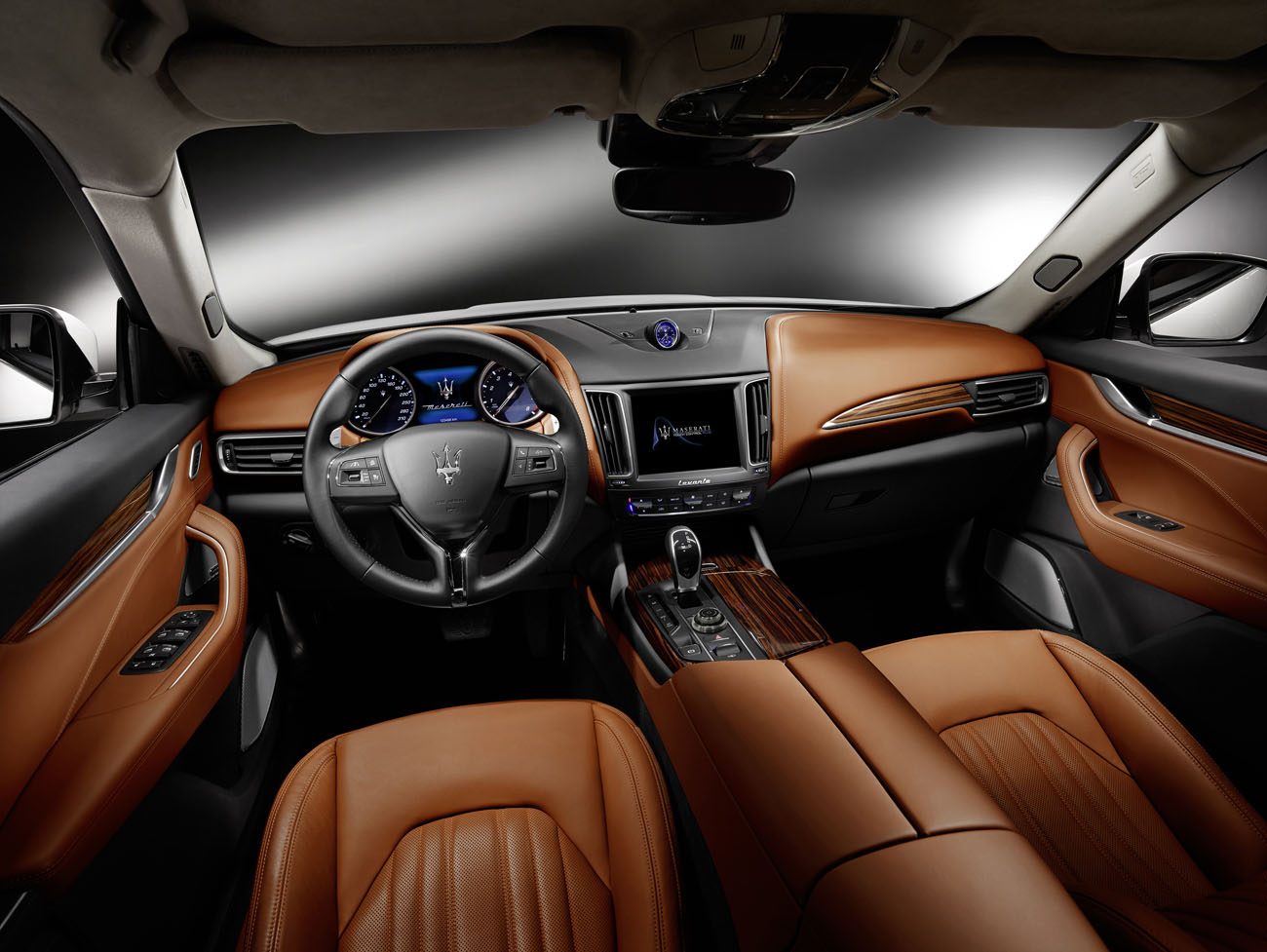
Brakes
The 430 hp Levante S features a state-of-the-art braking system that deals superbly with its high performance. The front system adopts Brembo 6-piston aluminium mono-bloc calipers working on 380 mm drilled discs. Aluminium 42 mm floating calipers with 330 mm x 22 mm ventilated drilled discs are fitted at the rear. The calipers are black by default with red, blue, yellow and silver colours available as optional extras.
The Maserati Levante 350 hp petrol and 275 hp diesel are equipped with 2-piston 48 mm floating callipers working on 345 mm x 32 mm ventilated discs at the front. The rear brakes are the same with the 430 hp version but without drilled discs. These calipers are anodised grey as standard and are available in a range of five colours with the Maserati logo as optional extras.
Driving Experience
There are three driving mode buttons – I.C.E., sport & off-road – in the selector next to the gear knob. “Sport” and “off-road” are two driving modes that enhance the dual character of the Levante, transforming it from a sporty, dynamic GT to a capable and comfortable off-road seeker at the push of a button.

The driver can completely de-activate the MSP and separately set up the height level of the car using the Air Suspension selector just below the hazard warning button.
The car starts in “normal” mode by default and can be changed by clicking the pre-selected mode button (I.C.E., sport or off-road). Torque distribution is the same in every drive mode: 0-100% front – rear which can vary up to 50-50% in just 150 milliseconds.
Normal Mode
The default mode provides a standard setup to the pedal response, the turbo boost and the exhaust. The driver can choose between two different suspension levels: “normal”, which provides 207 mm minimum ground clearance, or Aero 1 (-20 mm). The suspension set-up is the best compromise between sport and comfort damping.
Sport Mode / increased suspension stiffness
The “Sport” mode highlights the car’s sportier and more dynamic character: the throttle pedal is more responsive, the engine mapping provides maximum over-boost throughout the range and the exhaust system opens completely, emanating a loud and deep guttural sound.

In Sport mode the driver can keep the default suspension level or lower it to Aero 1. The MSP has a specific sport set-up that allows the driver to exploit the car’s on-road potential to the full. In the sport mode torque vectoring is active as well.
When the driver clicks the “Sport” button twice, the selected mode not only calibrates the engine and transmission but also increases the suspension stiffness, giving the car better handling characteristics and switching the suspension height level to Aero 1
(-20 mm). On the screen, the air suspension image turns green along with other components. The driver can modify the height of the car, from “Aero 1” to “normal”, whilst maintaining sport mode and sport suspension damping.

Off-Road Mode
The off-road suspension mode can be selected using the appropriate button or from the rocker control. In this case, the ride height increases by 25 mm (off-road 1), the Skyhook system response changes and thanks to the ESP control, it can detect specific situations. The driver can raise the car by a further 15 mm (off-road 2), some 40 mm higher than in the default mode. The resulting ground clearance reaches the outstanding figure of 247 mm.
I.C.E. Mode
The Increased Control & Efficiency mode is designed for improved fuel economy, relaxed driving and low grip conditions. The transmission is set to automatic only and provides the most gentle gear changes possible. The Air Suspension setting is the same as in “normal” mode. The gas pedal mapping is set to comfort mode and all engine parameters contribute to decreasing CO2 emissions and minimising fuel consumption. No over-boost is available and the exhaust bypass is closed up to 5,000 rpm.
Hill Holder
The Hill Holder system uses the on-board sensors to detect the vehicle’s angle when parked facing uphill and keeps the braking pressure for a few seconds so that the driver has enough time to release the brake pedal and accelerate before the car rolls backwards.

Hill Descent Control
Hill Descent Control (HDC) allows a smooth and controlled hill descent on snow or rough terrain without the driver needing to touch the brake pedal.
When activated via the dedicated button on the steering wheel, the vehicle will descend using the ABS to control each wheel’s speed. If the vehicle accelerates with no intervention from the driver, the system will automatically apply the brakes to slow down to the desired speed that can be set up using the Cruise Control buttons.
By applying pressure to the accelerator or the brake pedal the driver can instantly override the HDC system.
Adaptive Cruise Control with Stop & Go
The Maserati Levante is equipped with a cruise control system as standard. The optional Adaptive Cruise Control (ACC) with integrated Stop & Go function further increases comfort and safety when driving on main roads and motorways.

When activated, ACC constantly monitors the space between the Levante and the vehicle ahead, maintaining a safe pre-set distance. If the traffic slows or another vehicle moves in front, it slows the car down by making it coast or by engaging the brakes. Conversely, when the vehicle ahead speeds up or moves into another lane, the system accelerates up to the pre-set speed.
The ACC uses a radar sensor, located on the front grille and a front-looking camera behind the internal rear-view mirror to detect the presence of a vehicle ahead. If the ACC is automatically braking, the stoplights go on as if the driver is braking.
Thanks to the integrated Stop & Go function, the car will adjust to the target vehicle’s speed until it comes to a complete stop and will depart automatically within 2 seconds.
Blind Spot Alert
The Blind Spot Alert (BSA) monitors detection zones on both sides of the car at speeds above 10 km/h and alerts the driver when a vehicle enters the blind spot zones.
The BSA uses two radar sensors, located inside the rear bumper, to detect vehicles that enter the blind spot zones from the rear, the front or from the side of the car. It monitors approximately one lane (3.3 m) on both sides. In the event of danger it activates a warning triangle in the appropriate exterior mirror and reacts with an audible warning if the driver uses the turn indicator to change lane.

The integrated Rear Cross Path (RCP) function aids the driver when backing out of parking spaces where vision of oncoming vehicles may be impaired or blocked. The RCP system uses sensors on either side of the rear bumper and detects any vehicles or people approaching from either side at speeds from 1-3 km/h to a maximum of 16 km/h. The RCP alert is both visual and audible.
Lane Departure Warning
The Lane Departure Warning (LDW) has been designed specifically for motorway driving in order to reduce the risk of the vehicle accidentally departing from its current lane.
If the vehicle unintentionally crosses the lane markers, graphic instructions on the instrument panel together with an acoustic chime warn the driver that the vehicle is veering out of its lane. When the indicators are activated no warning is given.

The system uses the same front looking camera in the rear-view mirror used by the AFS lighting system. The LDW can be de-activated from the Maserati Touch Control Plus and is reactivated automatically every time the engine restarts. The system works at speeds above 70 km/h.
Forward Collision Warning
The Forward Collision Warning (FCW) monitors vehicles ahead by means of a camera and warns the driver via visual, audible and haptic (brake jerk) alerts when in danger of a possible rear-end collision.
If the driver does not take action, the system will provide a limited level of active braking to help slow the vehicle down and minimise the impact.

If the driver brakes and the system determines that the driver has not applied sufficient brake force, the Advanced Brake Assist will compensate for this and provide the appropriate amount of additional braking. The driver can adjust the FCW sensitivity from “far” (default status) to “near” mode that gives less time for reaction. FCW can be deactivated completely.
Rear View & Surround View Camera
The rear parking camera is located above the license plate. It turns on automatically when the reverse gear is selected and shows the area behind the car on the high resolution head unit display.
The Surround View Camera system uses four cameras in total and provides a clear 360° view around the car on a top-down image in the 8.4″ MTC Plus Display. It is activated automatically in reverse gear or manually via the soft button on the 8.4″ MTC Plus Display.

Park Assist
The Park Assist system provides visual and audible indications of the distance between the rear or front bumper and a detected obstacle when reversing or moving forward. The screen in the instrument cluster display provides visual warnings and an increasingly frequent sound according to the obstacle distance.
Four sensors in the rear bumper monitor the area behind the vehicle up to approximately 2 metres and six sensors in the front bumper monitor the area in front of the vehicle up to 1.2 metres.
Safety
The Maserati Stability Program (MSP) is an advanced active safety and driver assistance system that was further developed for the dual (on-road and off-road) character of the Levante. Thanks to a series of sensors, it detects any unusual handling behaviour and acts upon the brakes and engine to restore the control of the car. The MSP is connected to the Hill Holder function and integrates the following subsystems:
- ABS with Electronic Brake-force Distribution (EBD)
- Anti Slip Regulation (ASR)
- Engine Torque Control (MSR) to prevent wheel lock in down-shifting
- Brake Assist System to increase brake pressure in panic braking
- Hydraulic Brake Assist (HBA) – brake force booster in panic braking
The Levante is equipped with the new Bosch ABS-ESP9, a state-of-the-art system that integrates the following advanced functions:
- Torque Vectoring in Sport mode
- Off-road mode with three specific settings: gravel roads / deep snow / wet grass.
- Rollover Mitigation to reduce roll-over risks thanks to built-in lateral acceleration algorithms.
- Hydraulic Brake Compensation that is able to increase the hydraulic pressure in case of possible failure or loss of efficiency.
- Trailer Sway Mitigation (TSM) that recognises the presence of a trailer and prevents or reduces wobble or fishtailing.
- Hill Start Assist (HSA)
- Hill Descent Control (HDC)

Passive Safety Systems
Special attention has been focused on the Maserati Levante’s passive safety without compromising its weight and torsional rigidity. The front of the occupant compartment (the pillars and under-door mouldings) features hot-moulded steel components, with a magnesium dashboard strut, whilst the rear is stiffened with high strength steel. The bars at the front and rear end are in extruded aluminium, whilst the doors and the bonnet are in stamped aluminium.
A third load path has been added at the front of the front suspension frame, improving the force distribution on the car’s structure and ensuring the stability of the body in frontal impacts.
Last but not least, the reinforcements on the rear longitudinal beams comply with US rear impact standard FMVSS 301 (Federal Motor Vehicle Safety Standards).

Airbag system
The Levante comes equipped with six airbags. Two front airbags, both dual-stage, plus two side airbags located in the front seats for torsos and hips protect driver and front passenger. Two side curtain airbags fitted in the roof lining next to the central pillar cushion the heads of front and rear passengers.
Seat belts and restraint systems
The front seats are equipped with anti-whiplash safety equipment to reduce trauma to the occupants’ upper vertebrae. In the event of an impact from behind, the reactive headrests automatically move in closer to reduce the distance between their surface and each passenger’s head.
The front three-point seat belts are equipped with pyrotechnic pre-tensioners and load limiters; in the event of a collision, these restrain passengers securely and help prevent injury.
Quality and Reliability
The Maserati Levante has been subjected to a long and rigorous program of reliability tests. The testing programmeincluded environments where no other Maserati had ever been before.
Several pre-production prototypes were driven in an exhaustive testing programmecovering millions of kilometres. Extreme hot climate tests were carried out in South Africa and in the deserts of UAE (United Arab Emirates) and Morocco, where daytime temperatures soared to 48-50°C.
Extreme cold climate tests were executed in Lapland and in New Zealand, while specific quality checks were carried out in China and in Dubai. High mileage reliability tests were carried out in the USA and in Russia. In such regional testing cycles, the cars were put to the test by local drivers.
Every single component of the Maserati Levante has been tested for endurance and its ability to satisfy the high standards of the luxury SUV segment.
Every single car coming off the production line is test driven on the road for a total of 50 kilometres, following the standardised Maserati procedure. Before it is delivered to the customer, the car undergoes an additional 30-minute quality check.
These are the final checks of a rigorous quality control system: four in the BIW unit, three in the paint unit, four at the assembly units, in addition to electrics checks, dynamometer bench testing, and a water test.
